Why you can trust Tom's Hardware
Gaming CPU Benchmarks on Ryzen 9 7900X — The TLDR
Below you can see the geometric mean of our gaming tests at 1080p and 1440p, with each resolution split into its own chart. Be aware that a different mix of game titles could yield somewhat different results (particularly with the Ryzen 7 5800X3D), but this serves as a solid overall indicator of gaming performance. As usual, we're testing with an Nvidia GeForce RTX 3090 to reduce GPU-imposed bottlenecks as much as possible, and differences between test subjects will shrink with lesser cards or higher resolutions. You'll find further game-by-game breakdowns below.
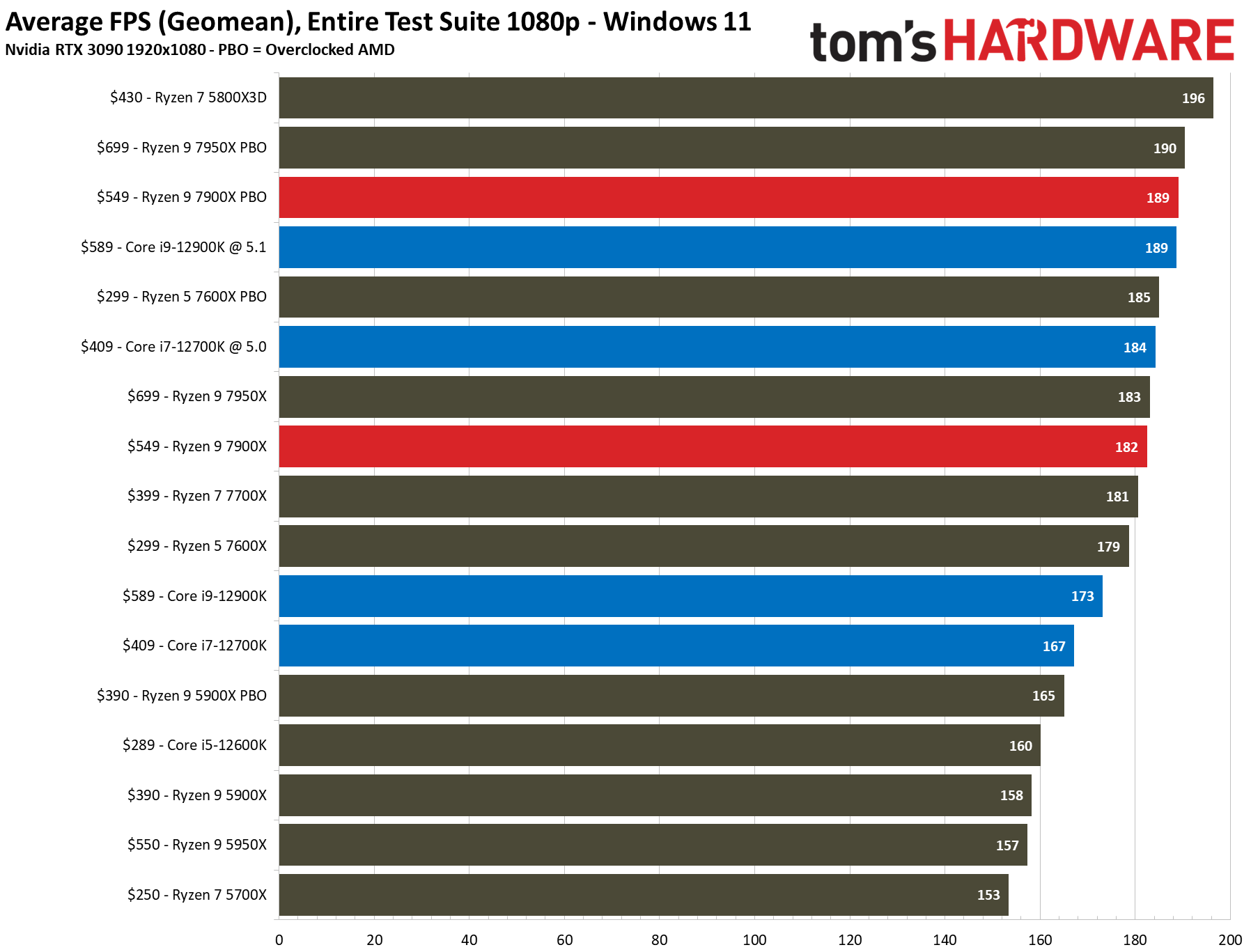
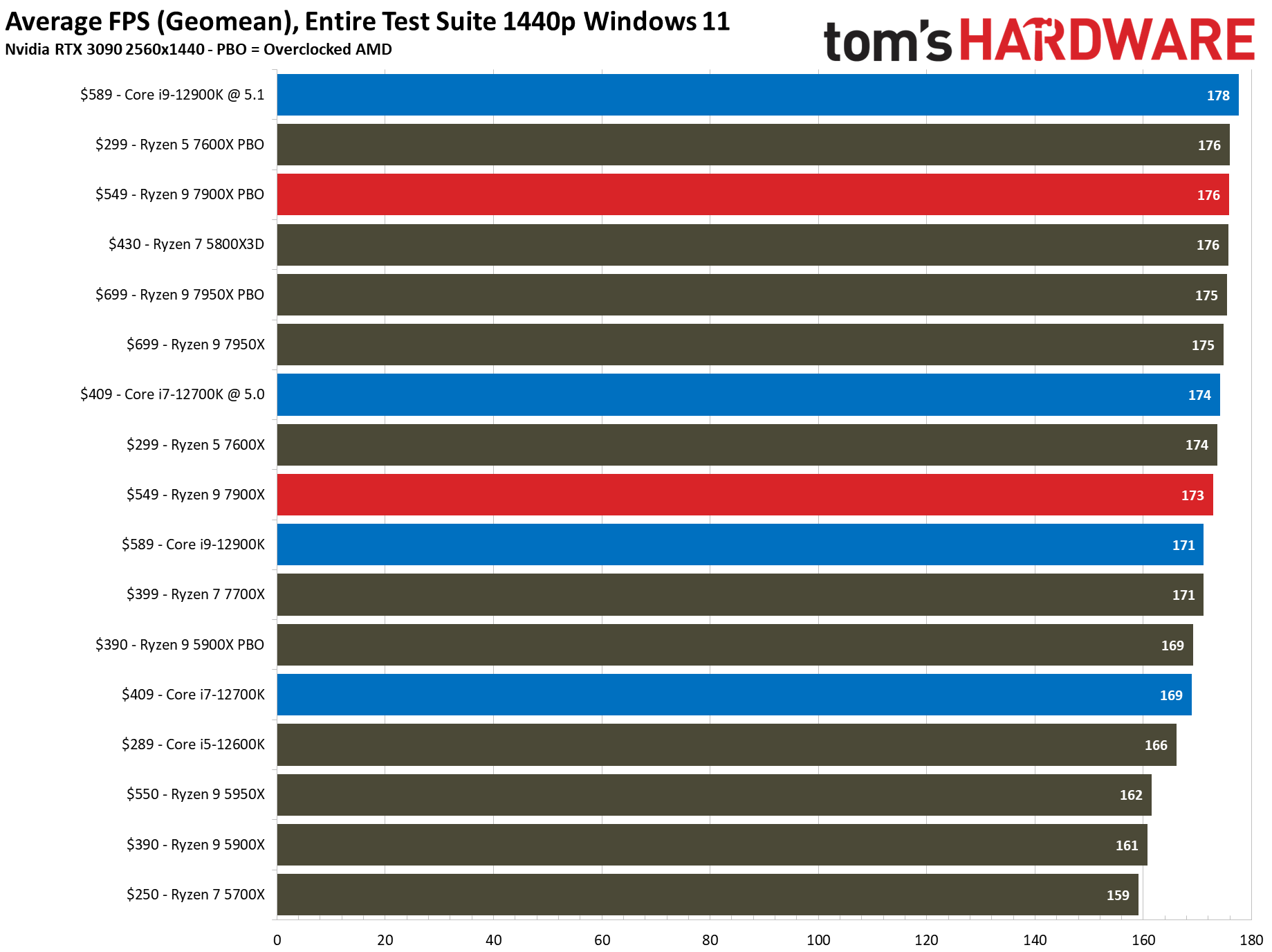
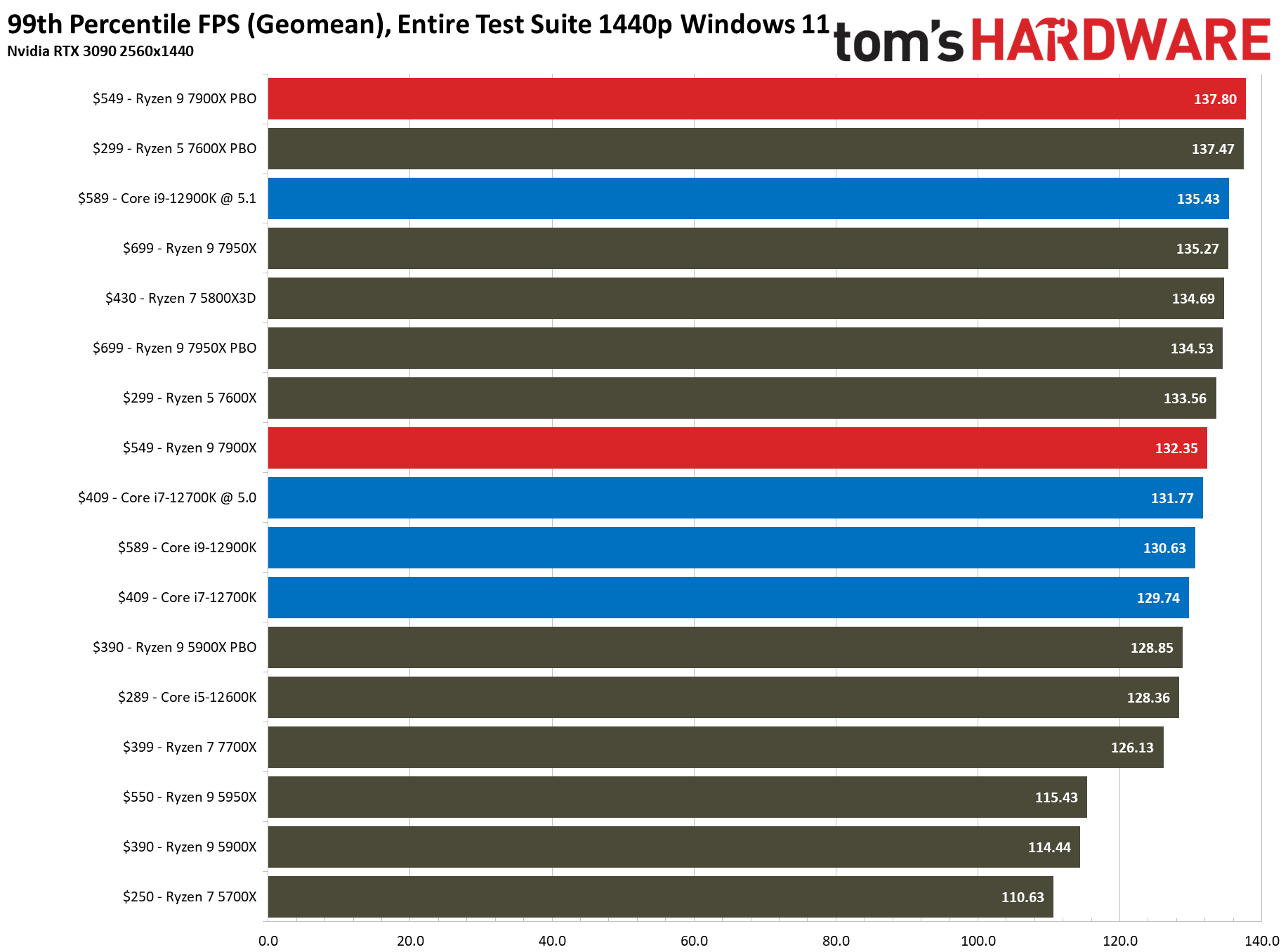
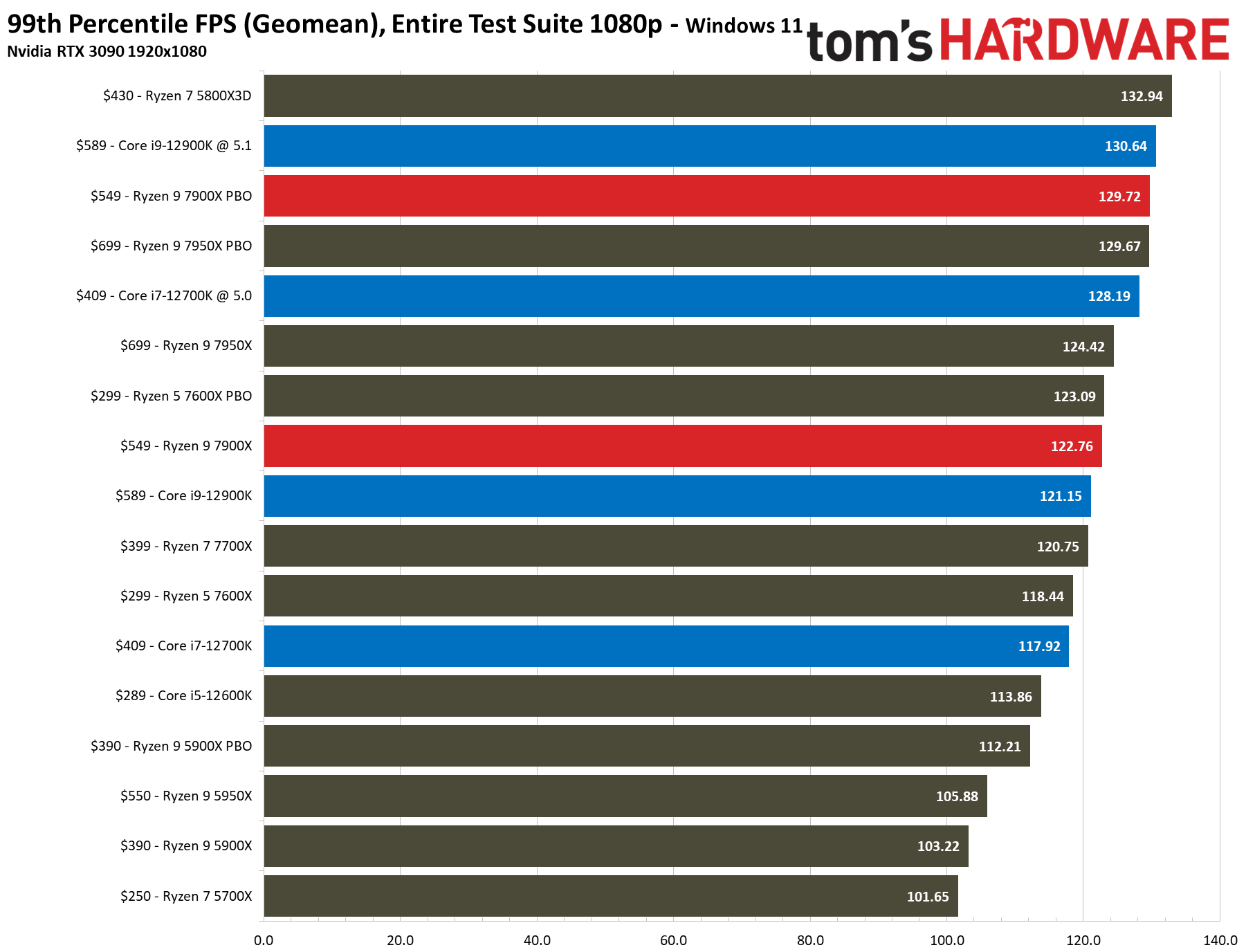
The $549 Ryzen 9 7900X is plenty impressive in gaming, effectively matching the $699 Ryzen 9 7950X at 1080p with both stock and overclocked settings. The Ryzen 9 7900X also fares well against the more expensive $589 Core i9-12900K, leading it by 5% at stock settings, and tying after overclocking.
The Ryzen 9 7900X is also 9% faster than the stock $409 Core i7-12700K, and 2.7% faster after tuning. But remember it also costs 34% more, meaning the 12700K is the better bang for your gaming buck. And that's before we factor in the higher DDR5 and motherboard costs associated with the AM5 platform.
We typically recommend Ryzen 5 or Core i5 for most dedicated gaming rigs, and the $299 Ryzen 5 7600X and $399 Ryzen 7 7700X are the perfect examples of why. Both of these chips provide within 1 to 2 percent of the performance of the Ryzen 9 7900X but are much less expensive. That means the 7900X is not a good value if you're strictly interested in gaming.
The 7900X does represent a big generational improvement, though — the Ryzen 9 7900X is 15% faster than its prior-gen counterpart, the Zen 3-powered Ryzen 9 5900X, which also comes with 12 cores.
However, Intel only needs to gain ~5% with Raptor Lake to match the 7900X in gaming, setting the stage for quite the competition next month.
AMD’s own $430 Ryzen 7 5800X3D remains the fastest gaming chip on the market by a fair margin, but this highly-specialized chip comes with caveats — its 3D V-Cache doesn't boost performance in all games. Additionally, the 5800X3D is optimized specifically for gaming, but it can't keep pace with similarly-priced chips in productivity applications. AMD will bring at least one Zen 4-powered Ryzen 7000 processor with 3D V-cache to market this year, so you might want to consider waiting a few more months if you’re after a specialized gaming chip.
| Tom's Hardware | 1080p Game Benchmarks - fps %age |
| $430 — Ryzen 7 5800X3D | 100% |
| $699 — Ryzen 9 7950X | 93.4% |
| $549 — Ryzen 9 7900X | 92.9% |
| $399 — Ryzen 7 7700X | 92.4% |
| $299 — Ryzen 5 7600X | 91.3% |
| $589 — Core i9-12900K | 82.3% |
| $409 — Core i7-12700K | 85.2% |
Naturally, the differences between the chips shrink when we switch over to 1440p and bring a GPU bottleneck into play, but the story remains largely similar, with scant differences between the chips at the top of the leaderboard. The competition between Intel and AMD is even closer now, so it's best to make an informed decision based on the types of titles you play frequently.
3D Mark DX11, DX12, and Chess Engines on AMD Ryzen 9 7900X
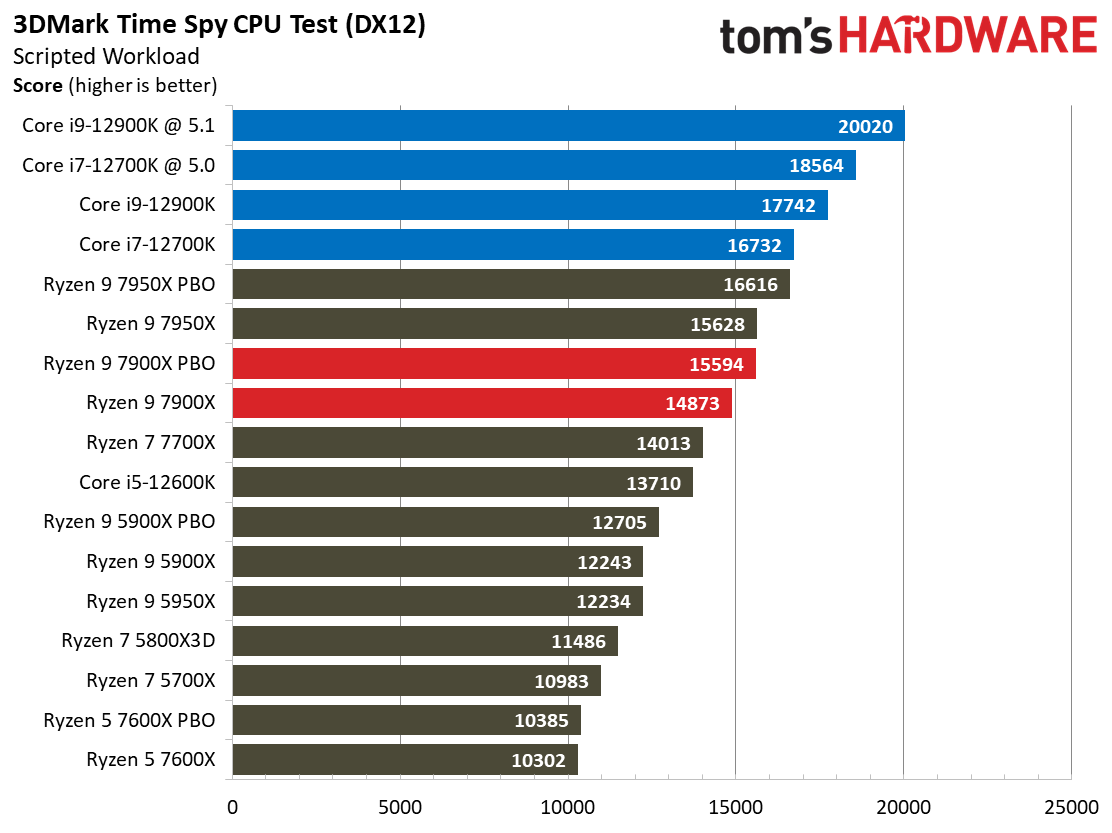
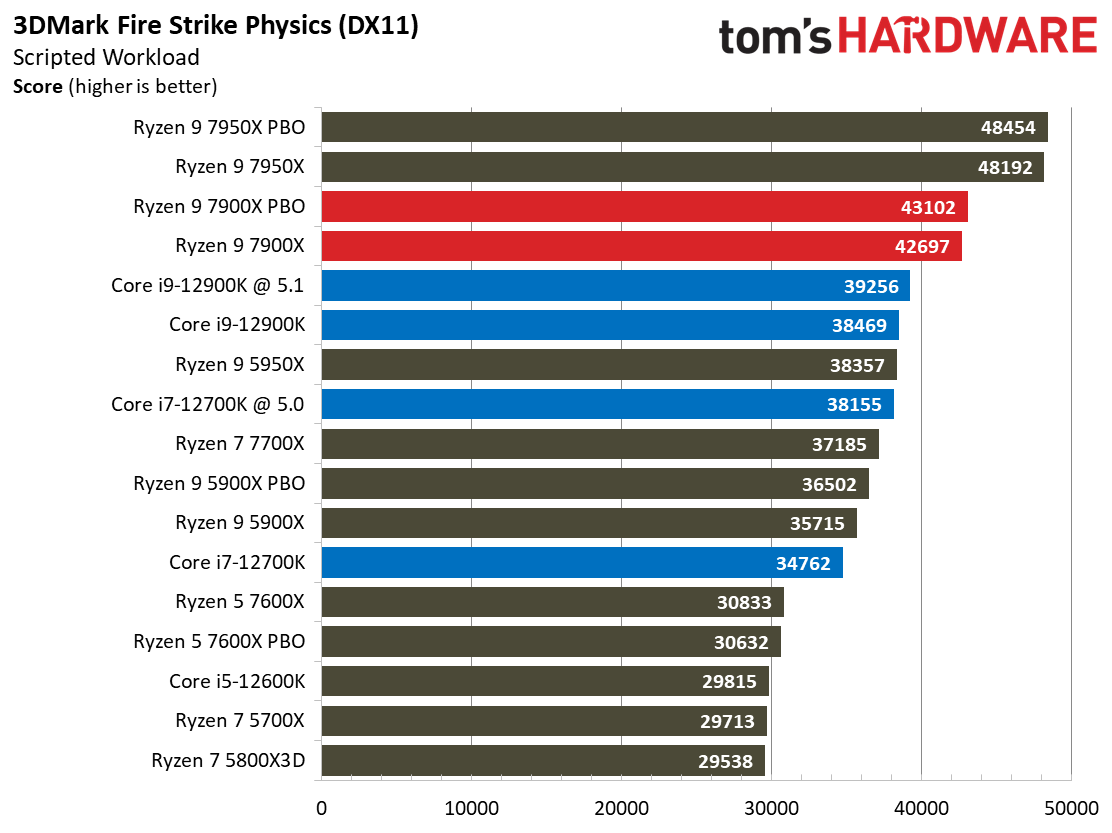
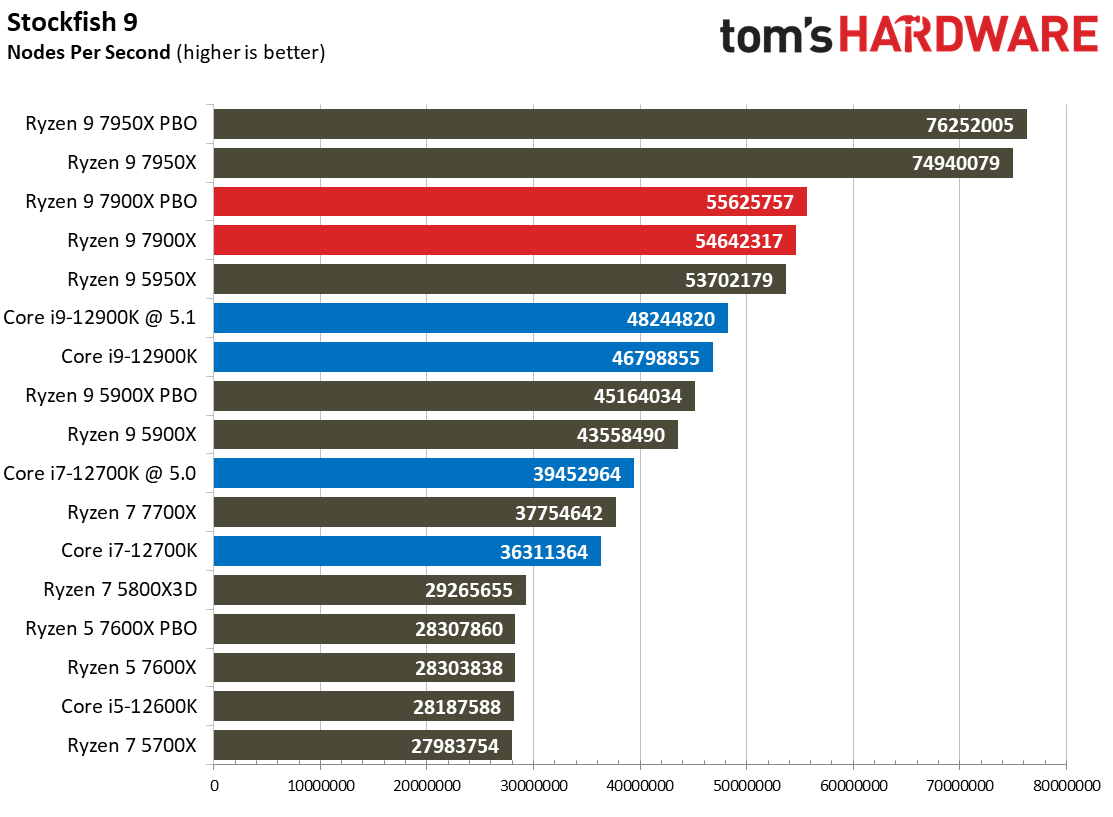
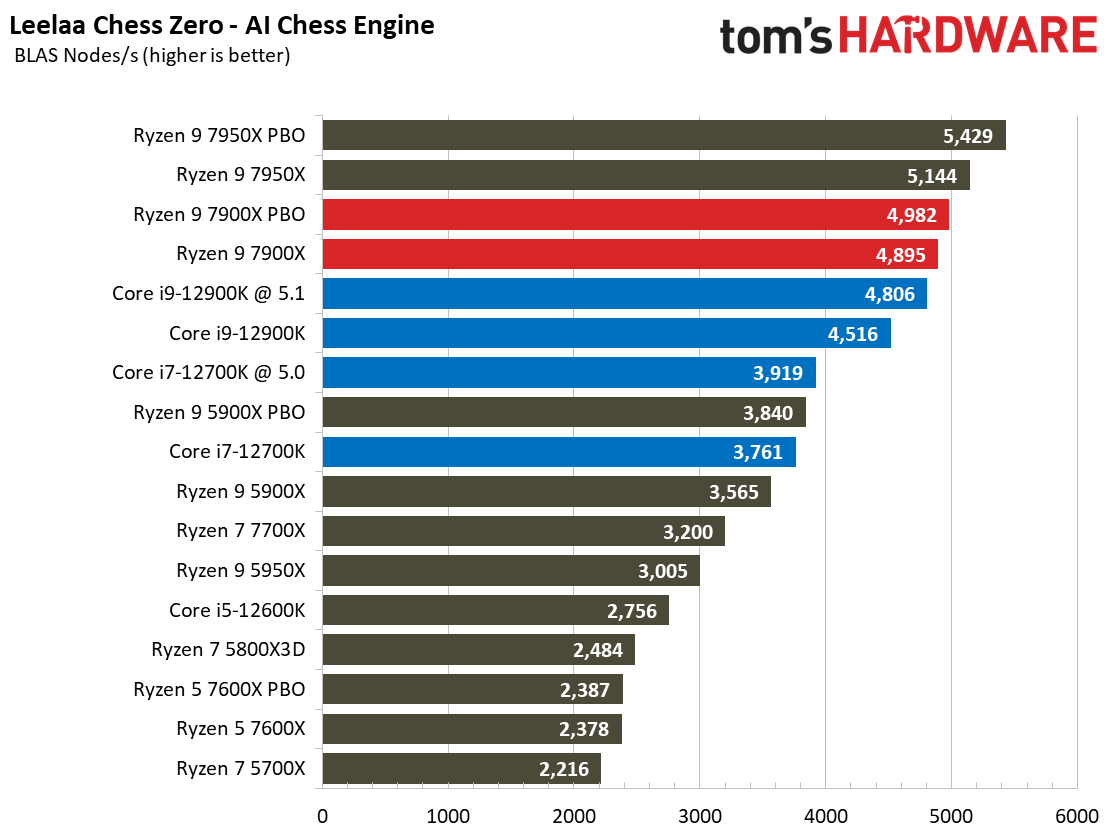
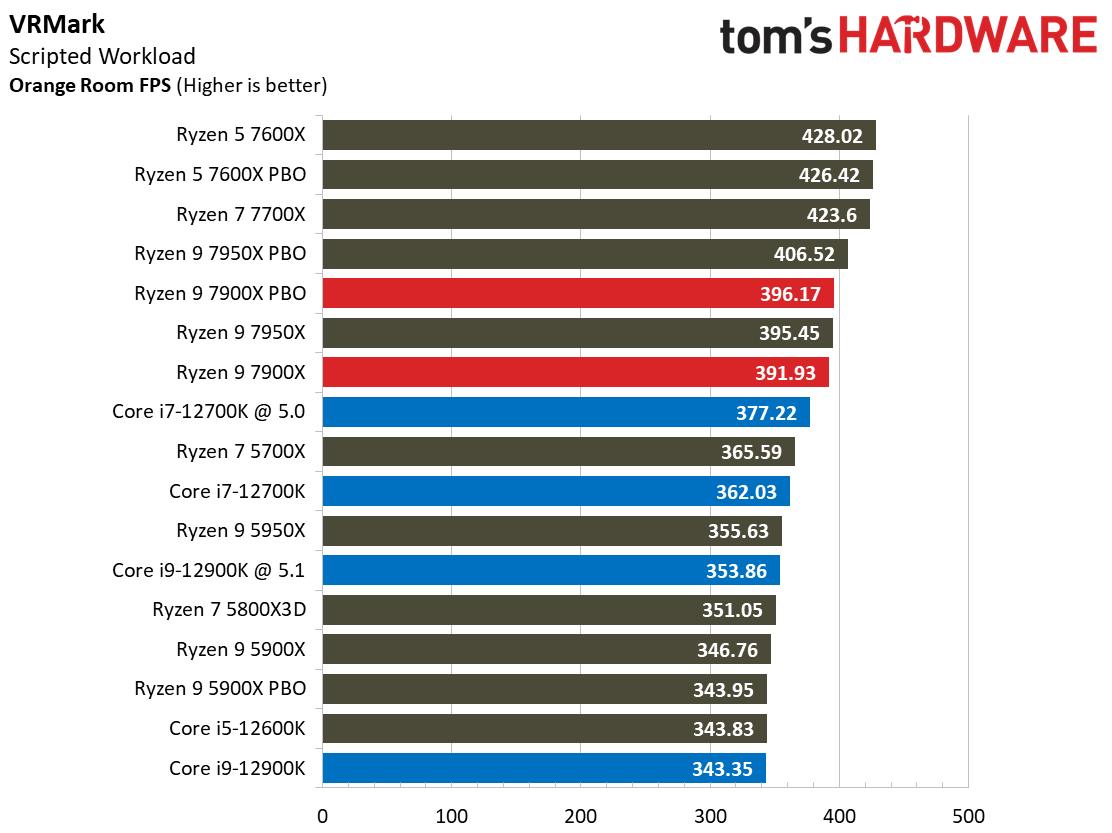
Synthetic benchmarks don't translate well to real-world gaming, but they show us the raw amount of computing power exposed to game engines. It's too bad most games don't fully exploit it.
The VRMark benchmark is exceptionally sensitive to single-threaded performance and memory latency. Here the Ryzen 7000 series shines, with lower core count models taking the lead while the beefier 7950X and 7900X fill out the ranks, maintaining a noticeable lead over the Intel comparables.
The Ryzen 9 7900X is faster than the Core i9-12900K in the DX11 CPU tests, but Intel’s Core i9 and i7 still hold the lead in DX12. The heavily-threaded chess engine benchmarks also profit from Ryzen 7000’s improved multi-threaded performance. The 7900X easily beats the 12900K in both benchmarks.
Far Cry 6 on AMD Ryzen 9 7900X
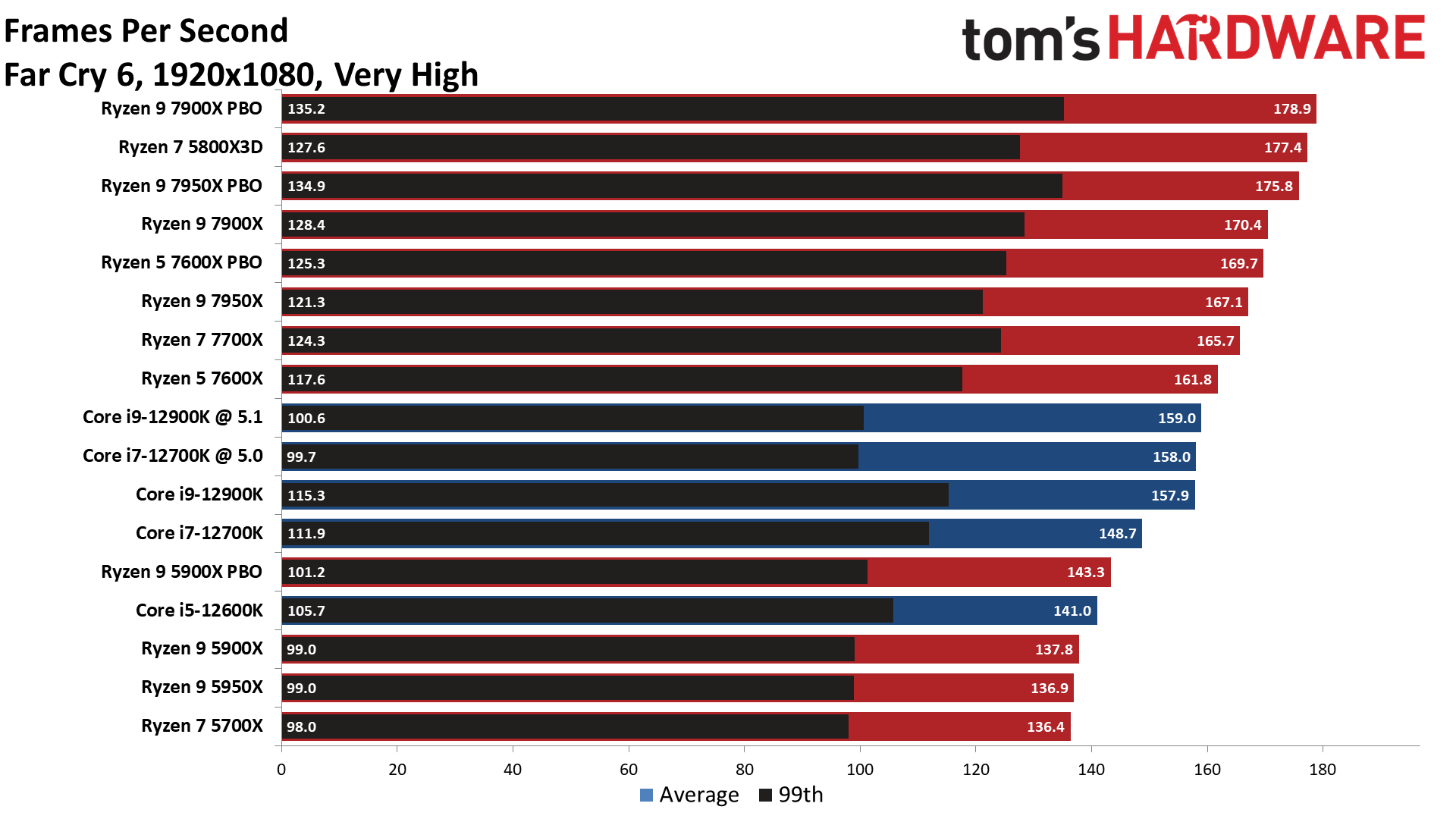
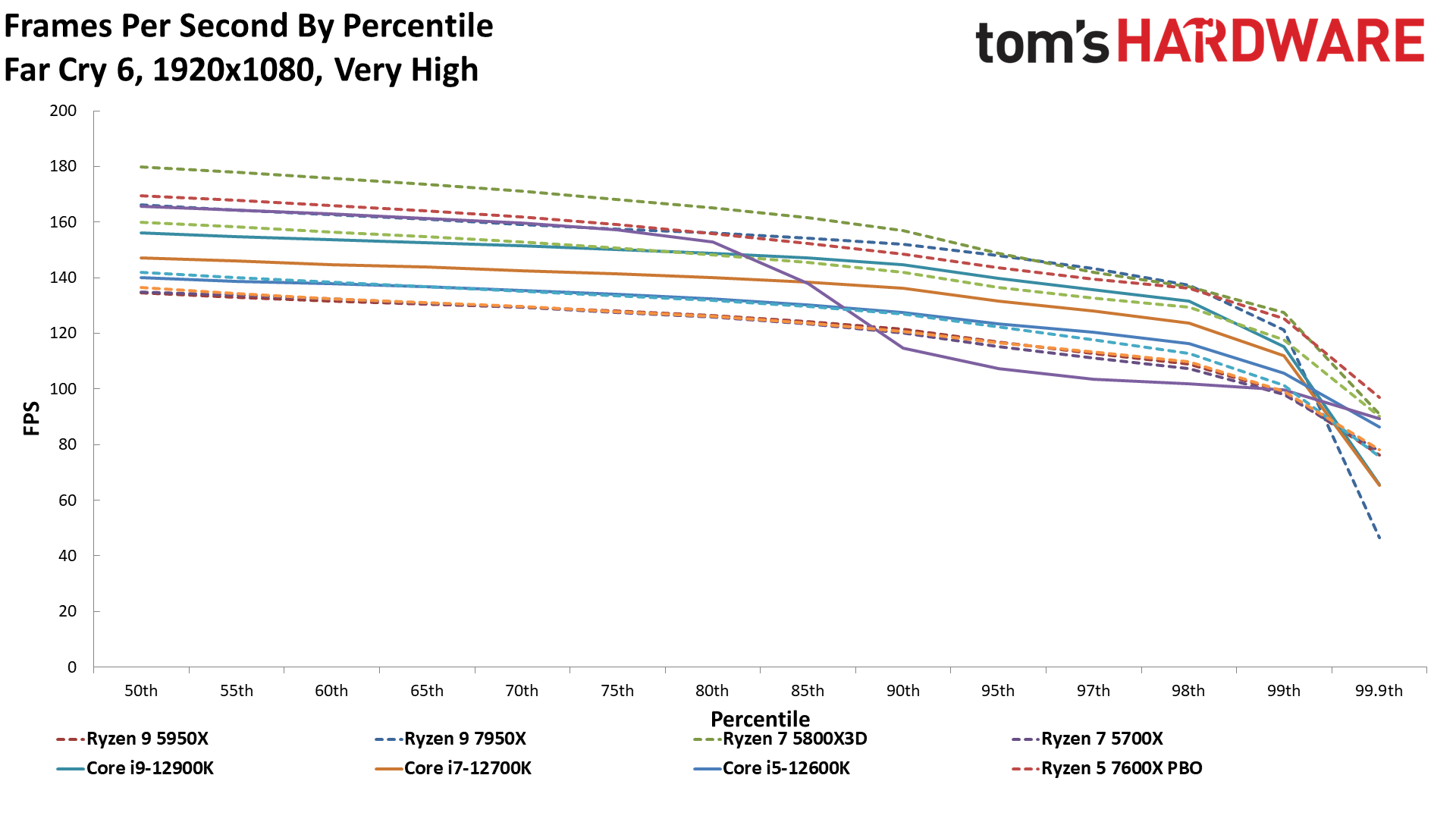
The Ryzen 9 7900X lives up to what we expect, which is 7950X-rivaling performance in some games, particularly after overclocking. Surprisingly, the 7900X outperforms the Ryzen 7 5800X3D in this title, but that's a rare occurrence in this suite of game benchmarks. The Ryzen 9 7900X is 8% faster than the 12900K and 14.6% faster than the 12700K.
We see roughly the expected uptick from overclocking the Ryzen 7000 models, but you’ll notice the Alder Lake chips suffer from lower 99th percentile measurements after tuning. That’s an interesting and repeatable condition, but it seems to be confined to this title in our suite.
F1 2021 on AMD Ryzen 9 7900X
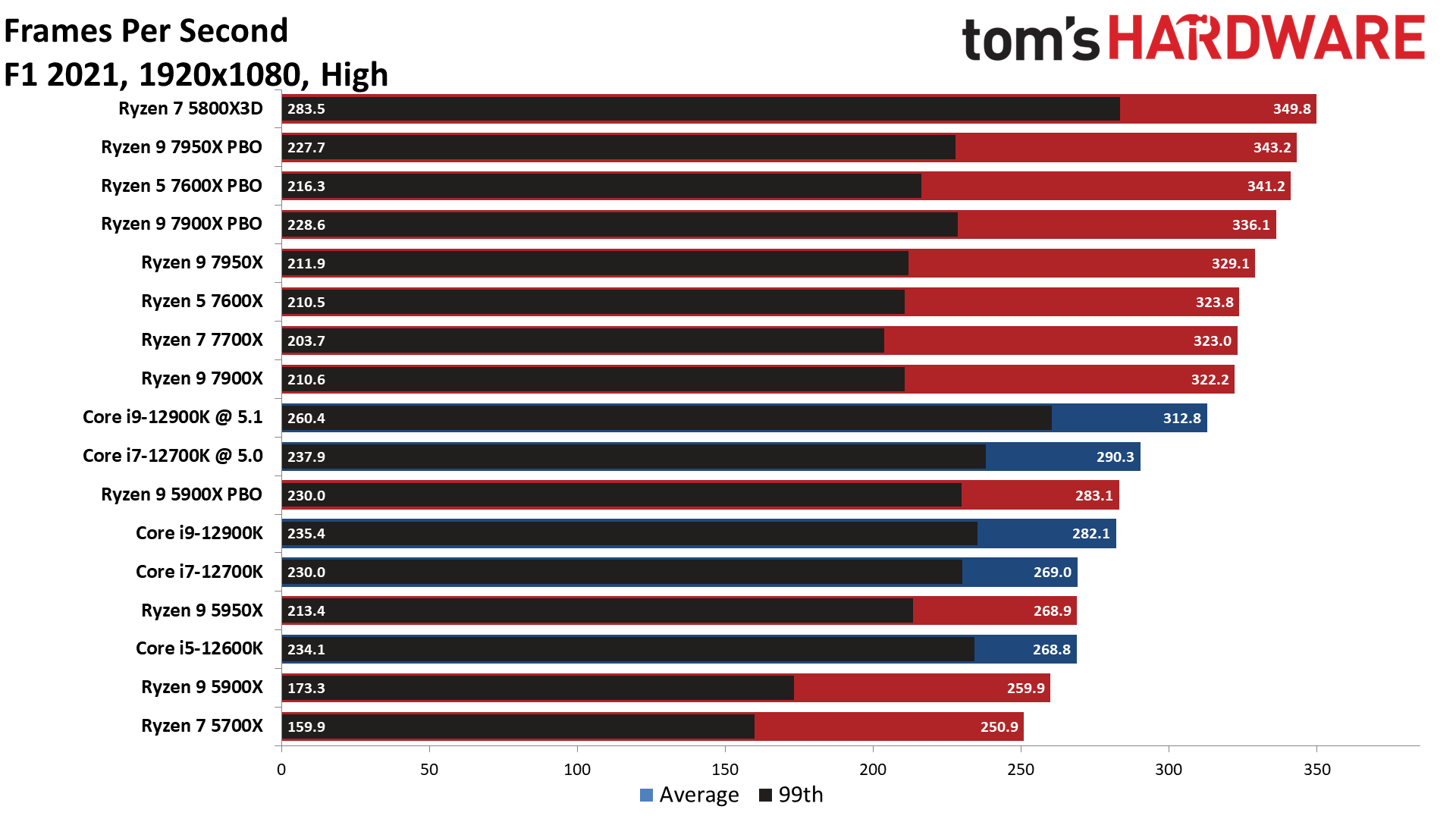
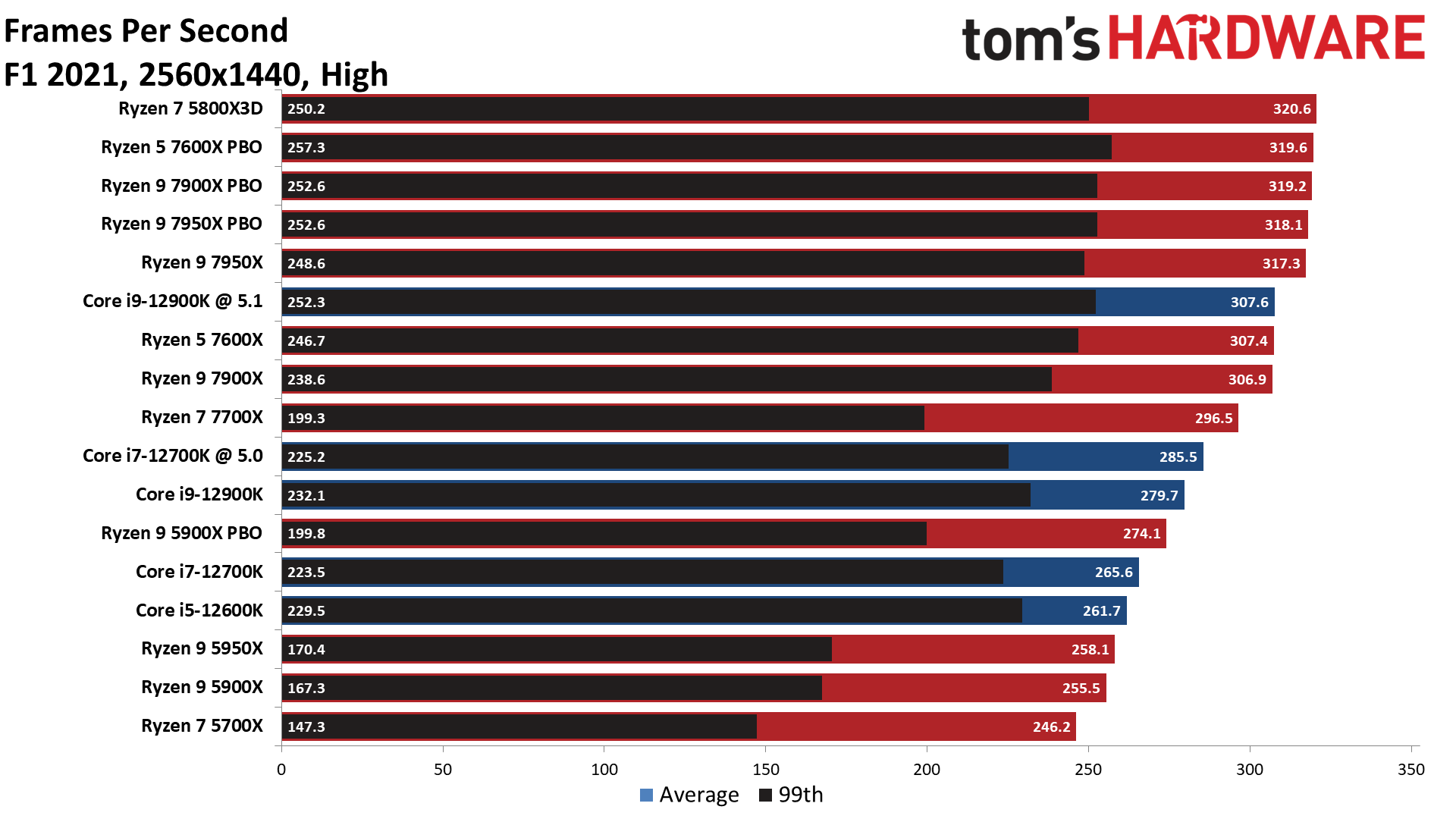
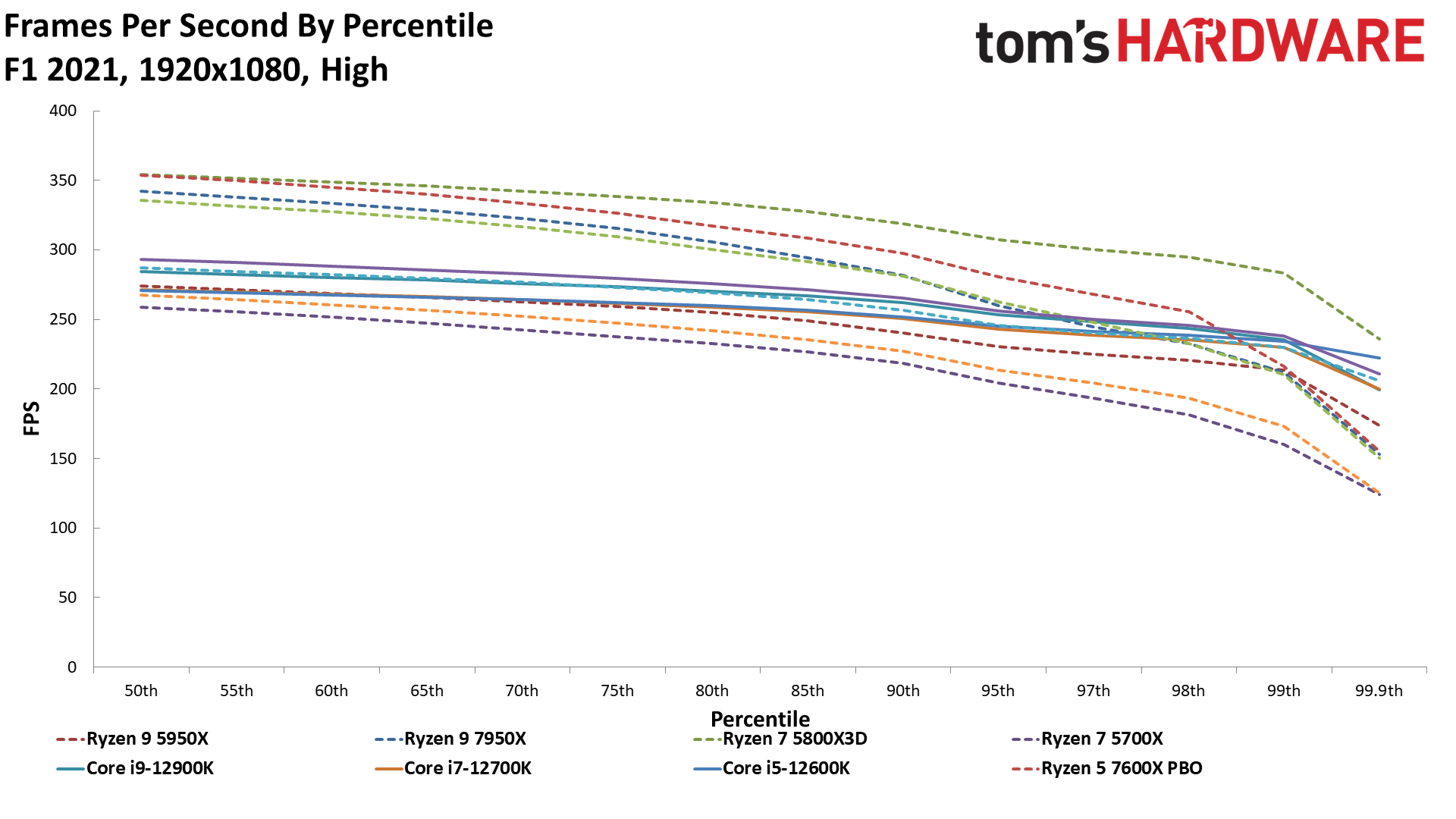
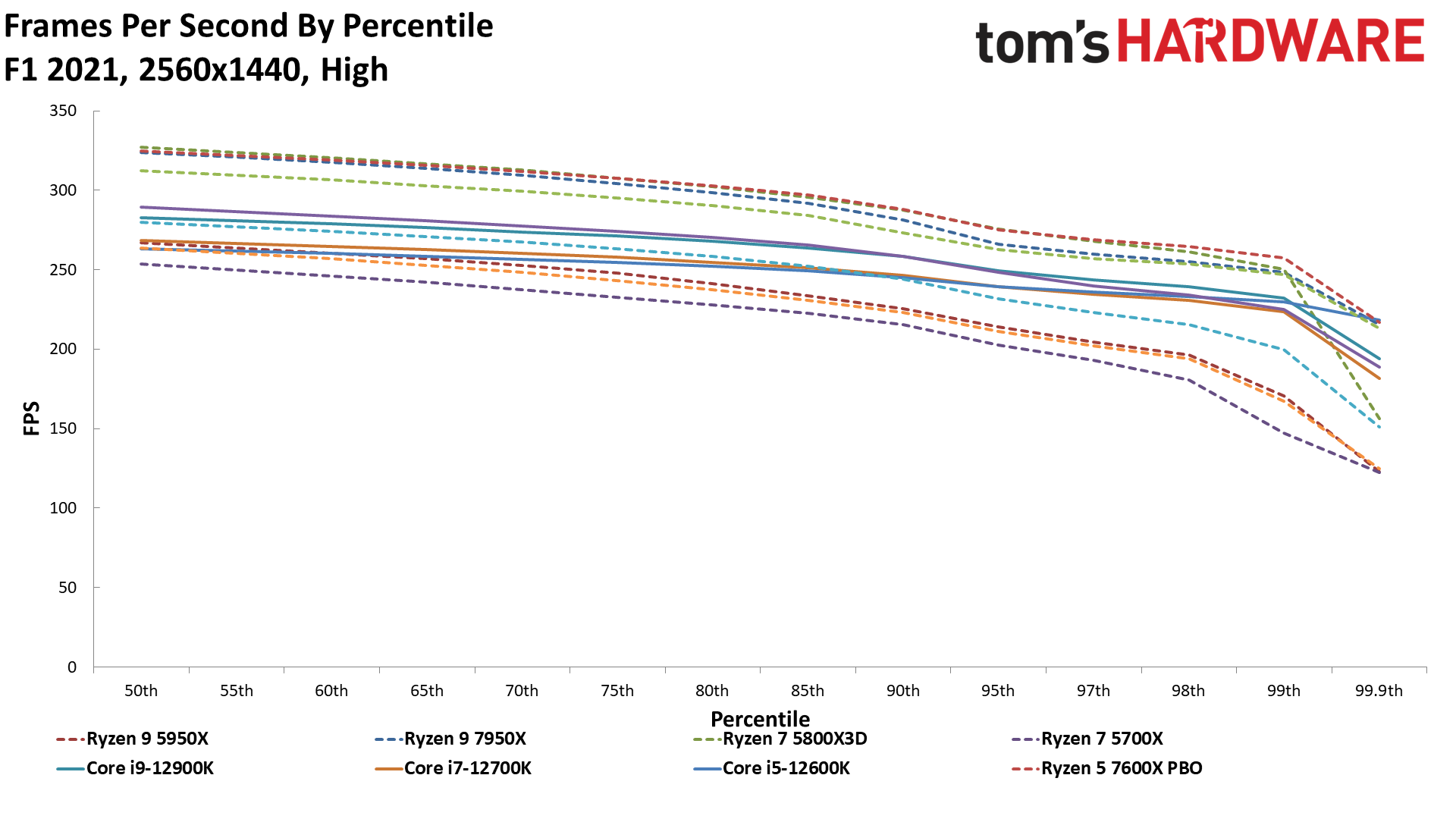
The Ryzen 7 5800X3D takes the overall lead, which we’ll see a lot as we flip through these titles, but remember that this chip can be finicky — some titles see little to no uplift.
The Ryzen 7000 chips take the top of the chart in overall framerates, but like their prior-gen counterparts, they have proportionally lower 99th percentile framerates than the Alder Lake processors. However, we didn’t notice any outwardly visible rough play, and we are looking at framerates in excess of 300 fps, so this is more of an interesting tendency than something that manifests as noticeably poor performance.
The Zen 4 chips take a big lead over the stock Intel comparables — even the heavily-overclocked Core i9-12900K struggles to keep pace with the stock Ryzen 7000 processors. We're pushing past 300 fps with this title, though, so the differences won't be noticeable during gameplay.
Hitman 3 on AMD Ryzen 9 7900X
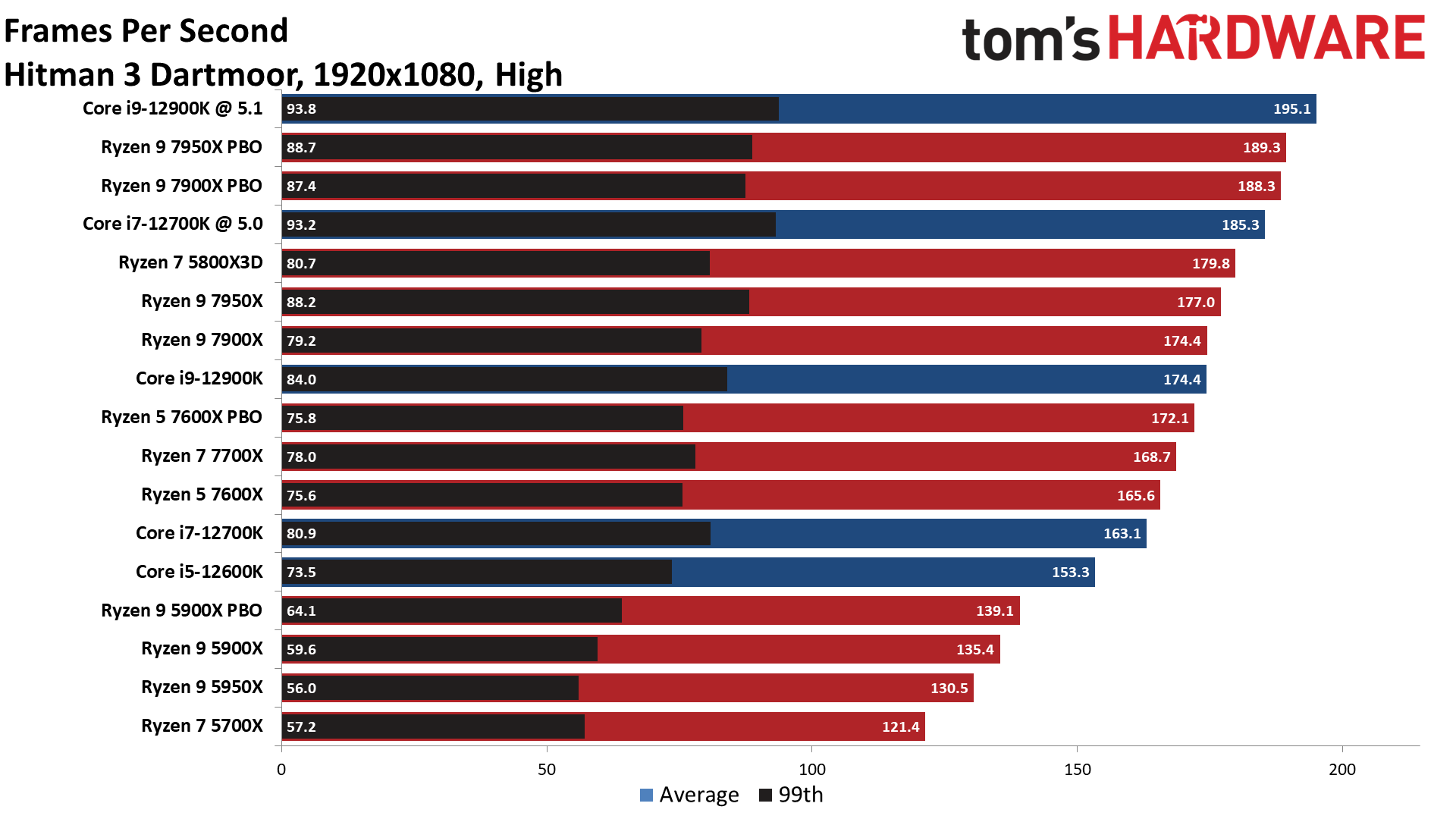
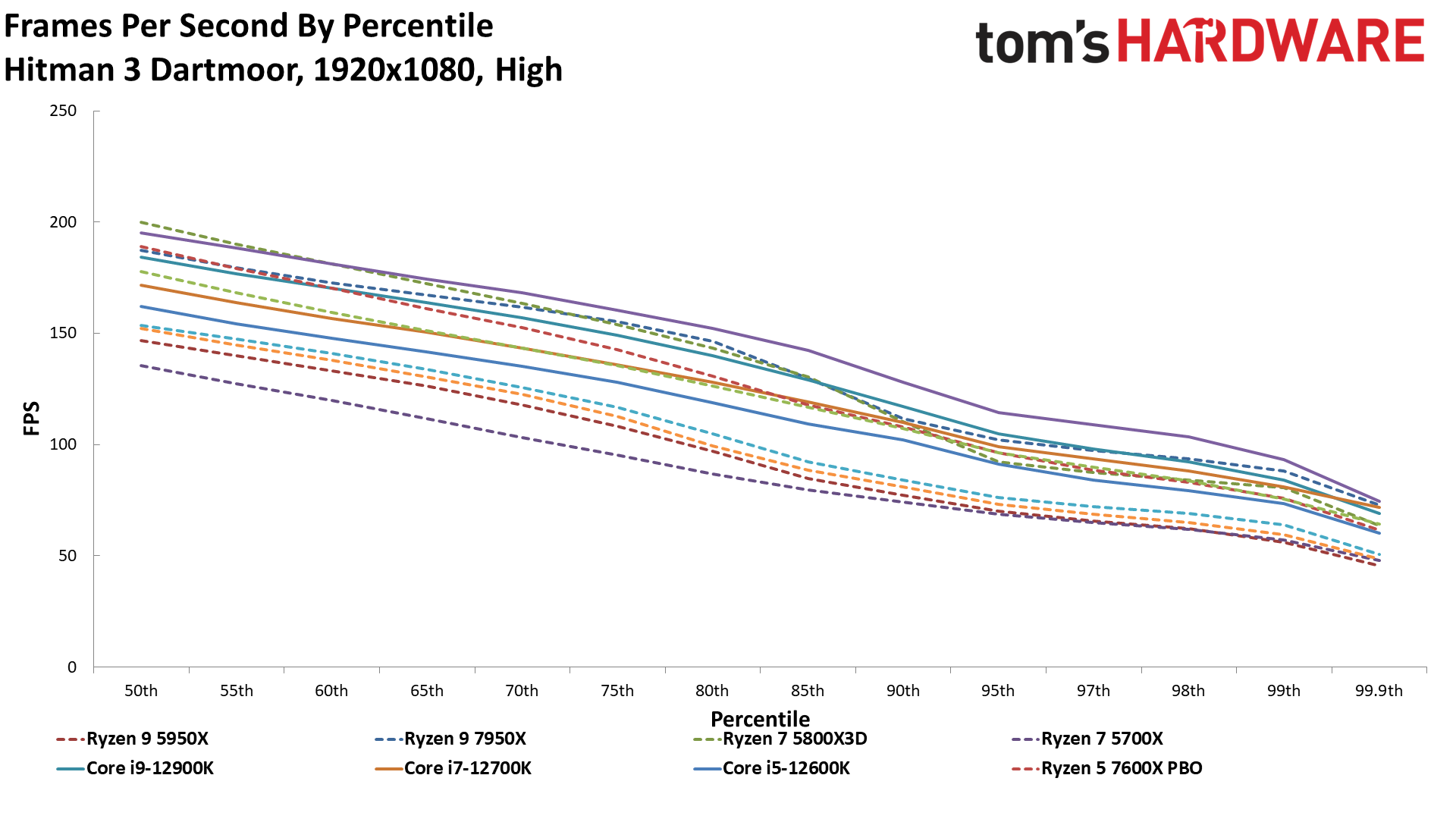
Intel used to enjoy a sizeable lead over Ryzen in Hitman 3 because the game is specifically tuned to leverage the E-cores by offloading low-priority tasks like physics to the small cores. Ryzen 7000 improves AMD's standing drastically, with the stock Ryen 9 7900X running neck-and-neck with the more expensive Core i9-12900K at stock settings. Intel still holds the advantage after overclocking, though.
Horizon Zero Dawn on AMD Ryzen 9 7900X
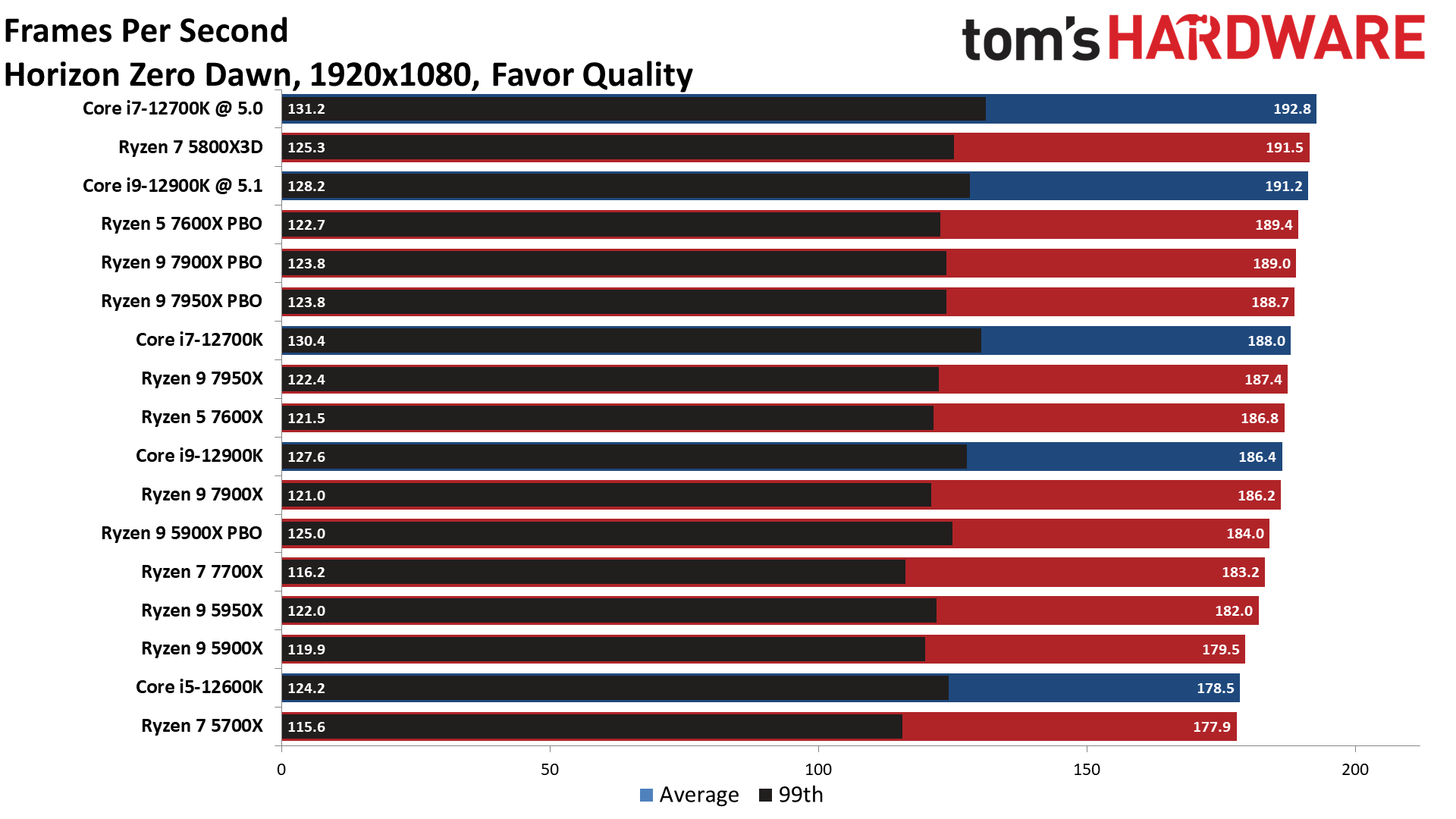
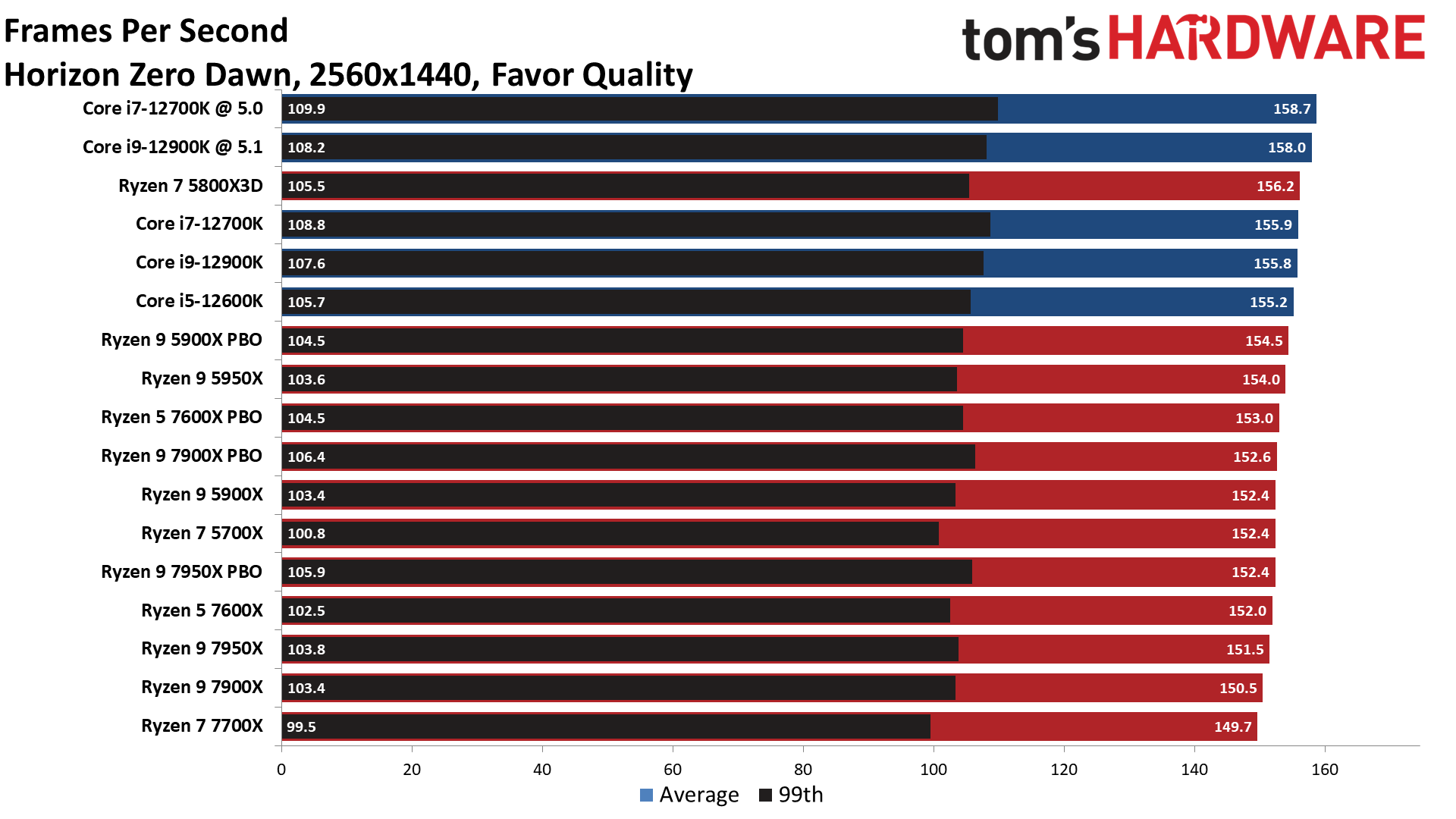
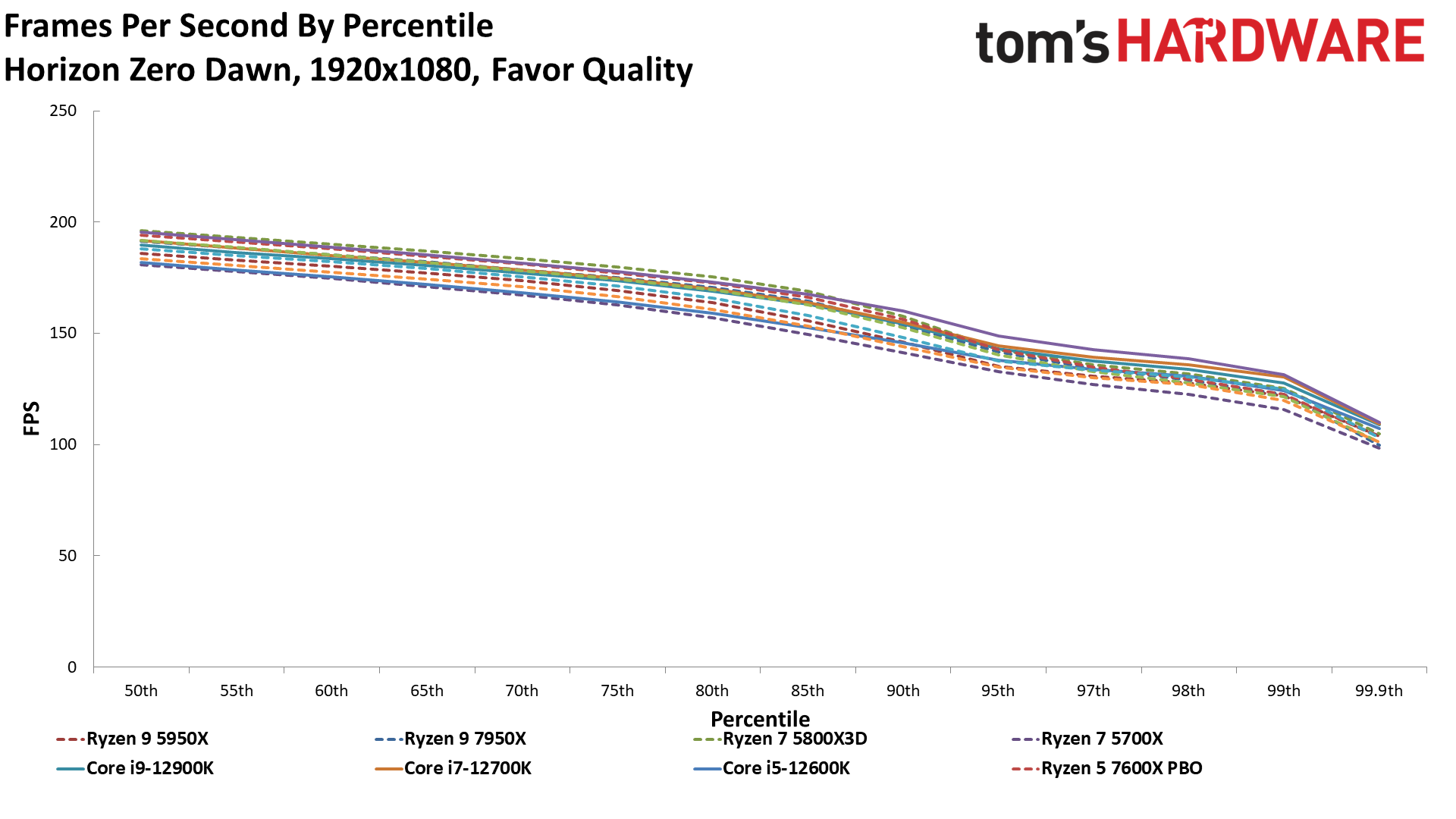
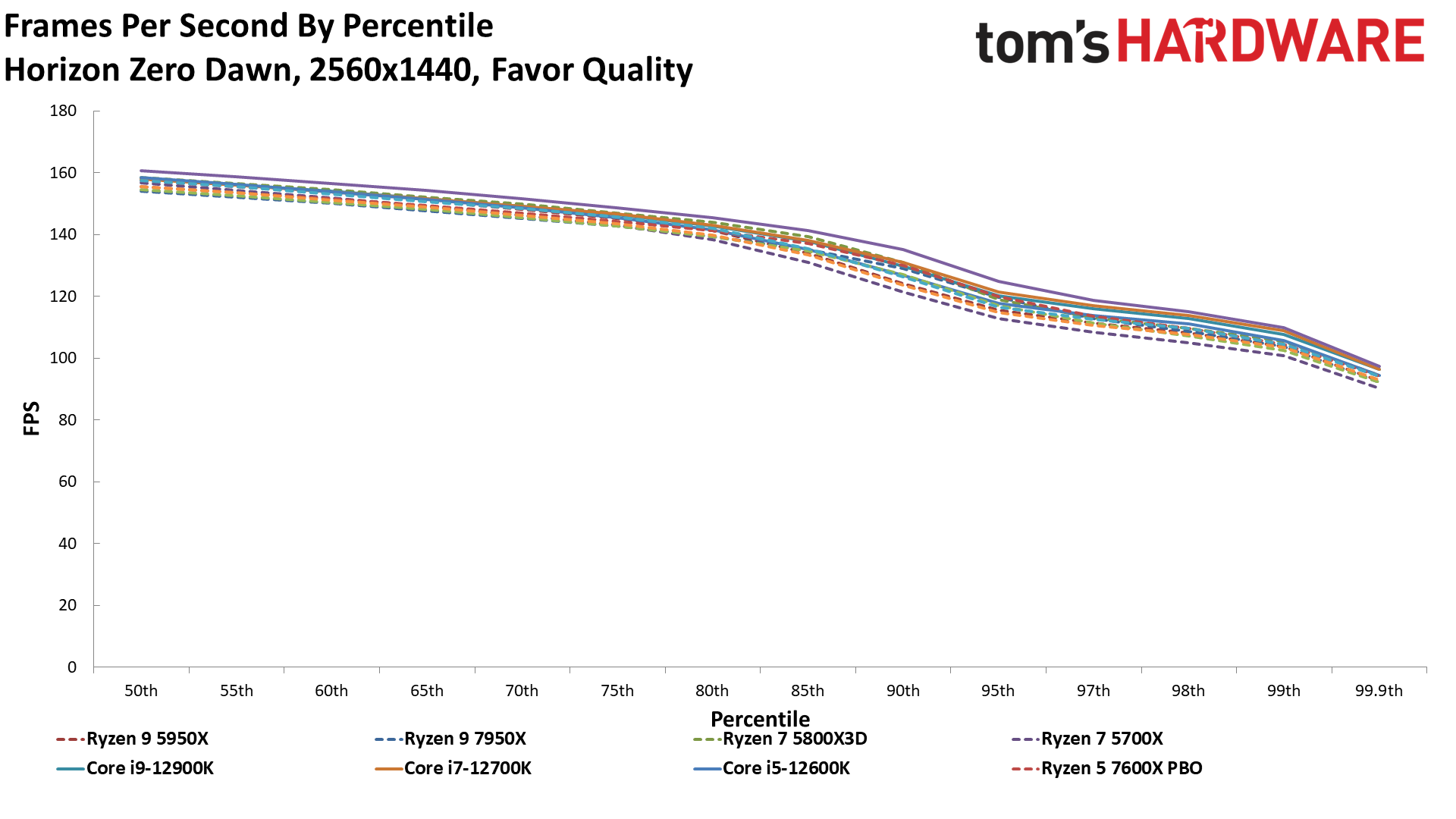
Horizon Zero Dawn doesn’t scale exceptionally well with more host processing power, so like many of the titles you’ll see in the real world, the delta between the highest-end chips can be slight.
Microsoft Flight Simulator 2021 on AMD Ryzen 9 7900X
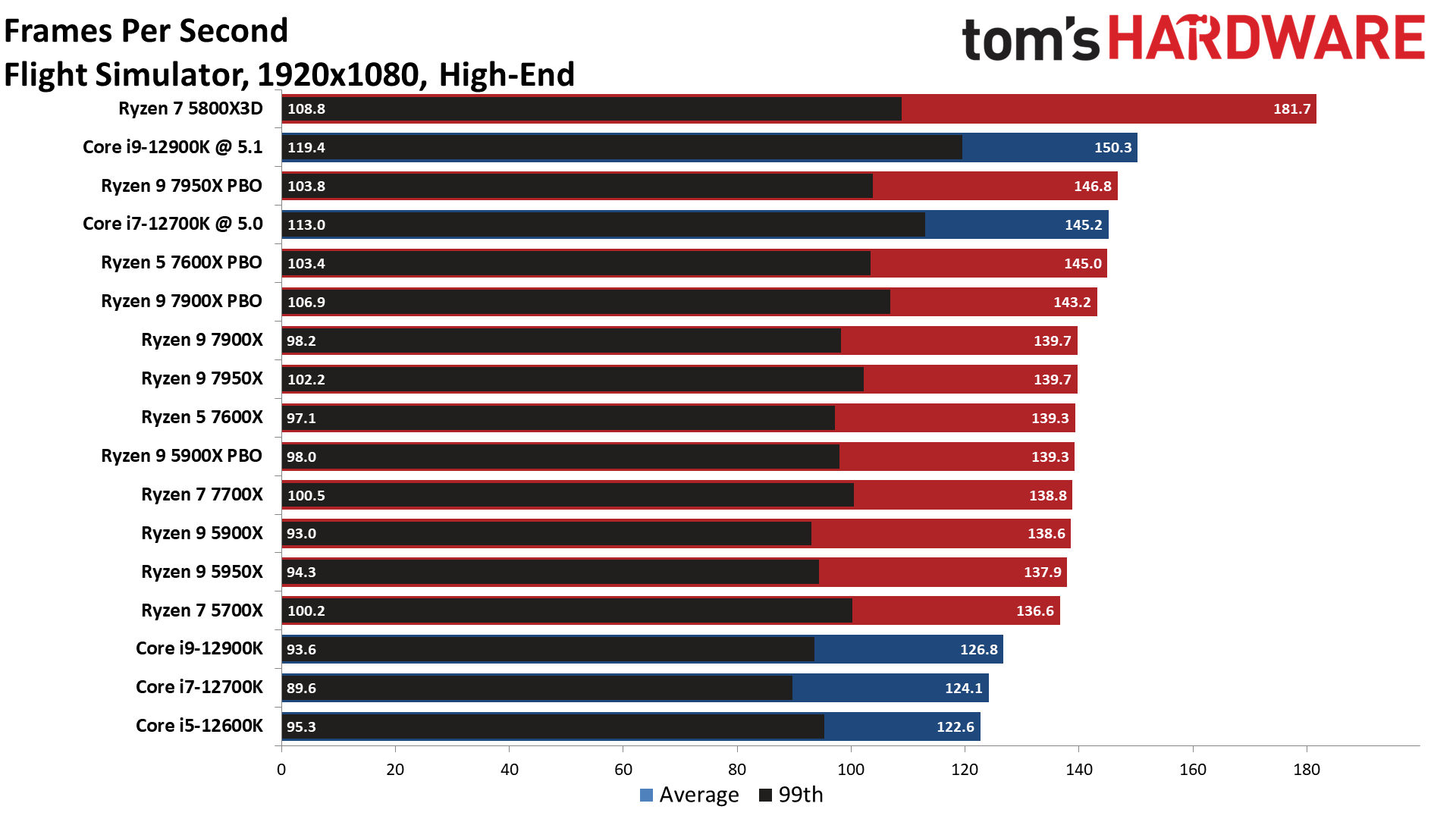
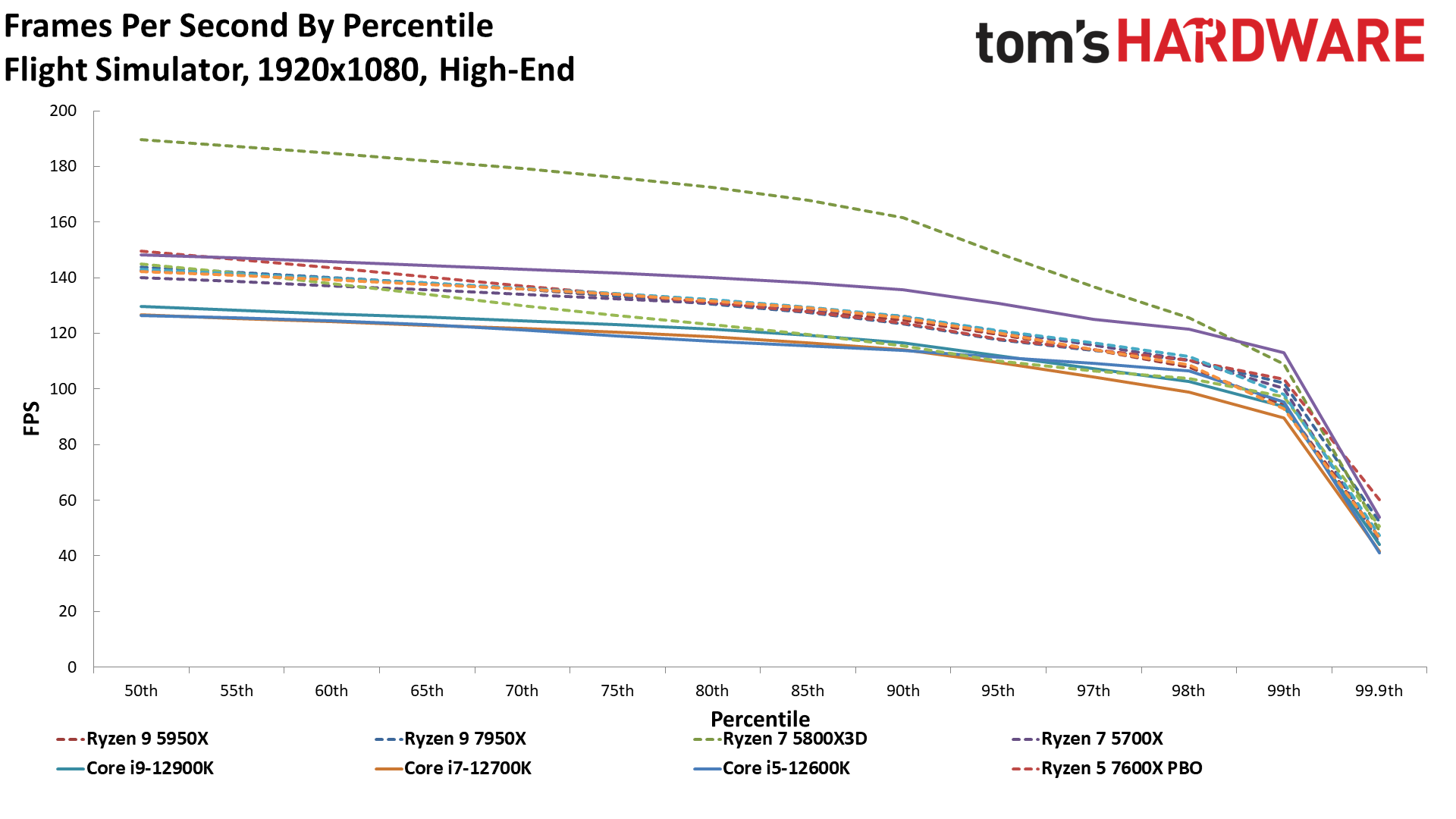
The Ryzen 7 5800X3D is simply outstanding in this title, highlighting that the chip can provide huge speedups in some titles. However, that can skew overall rankings. This is why the chip is, on average, the fastest gaming chip in the world, but be aware that it can change drastically based on the game you’re playing.
The Ryzen processors, including the previous-gen models, beat Intel's Alder Lake at stock settings. Despite Intel’s big overclocking gains, the tuned Ryzen chips land within a few percent of their price-comparable competitors.
Red Dead Redemption 2 on AMD Ryzen 9 7900X
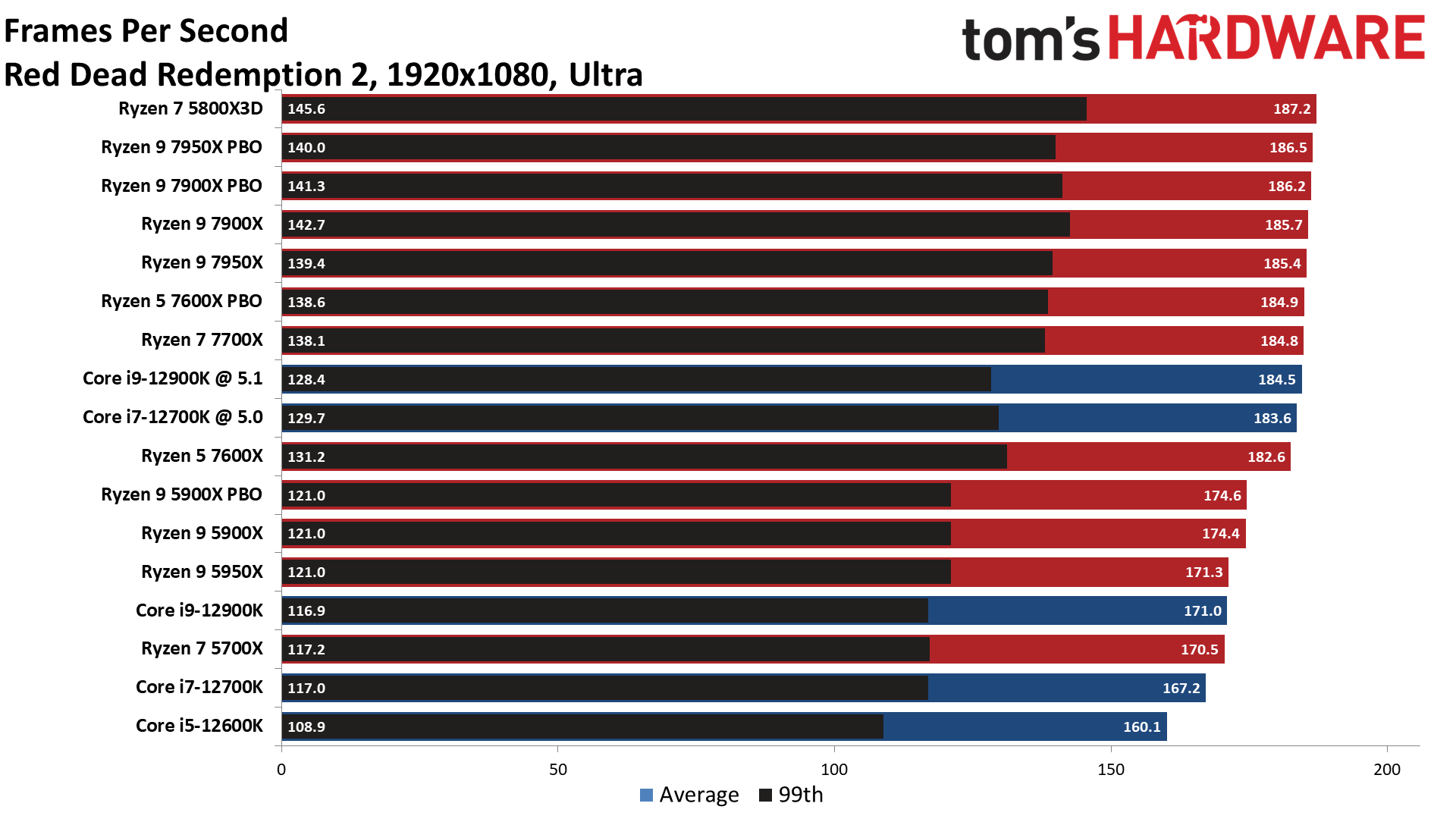
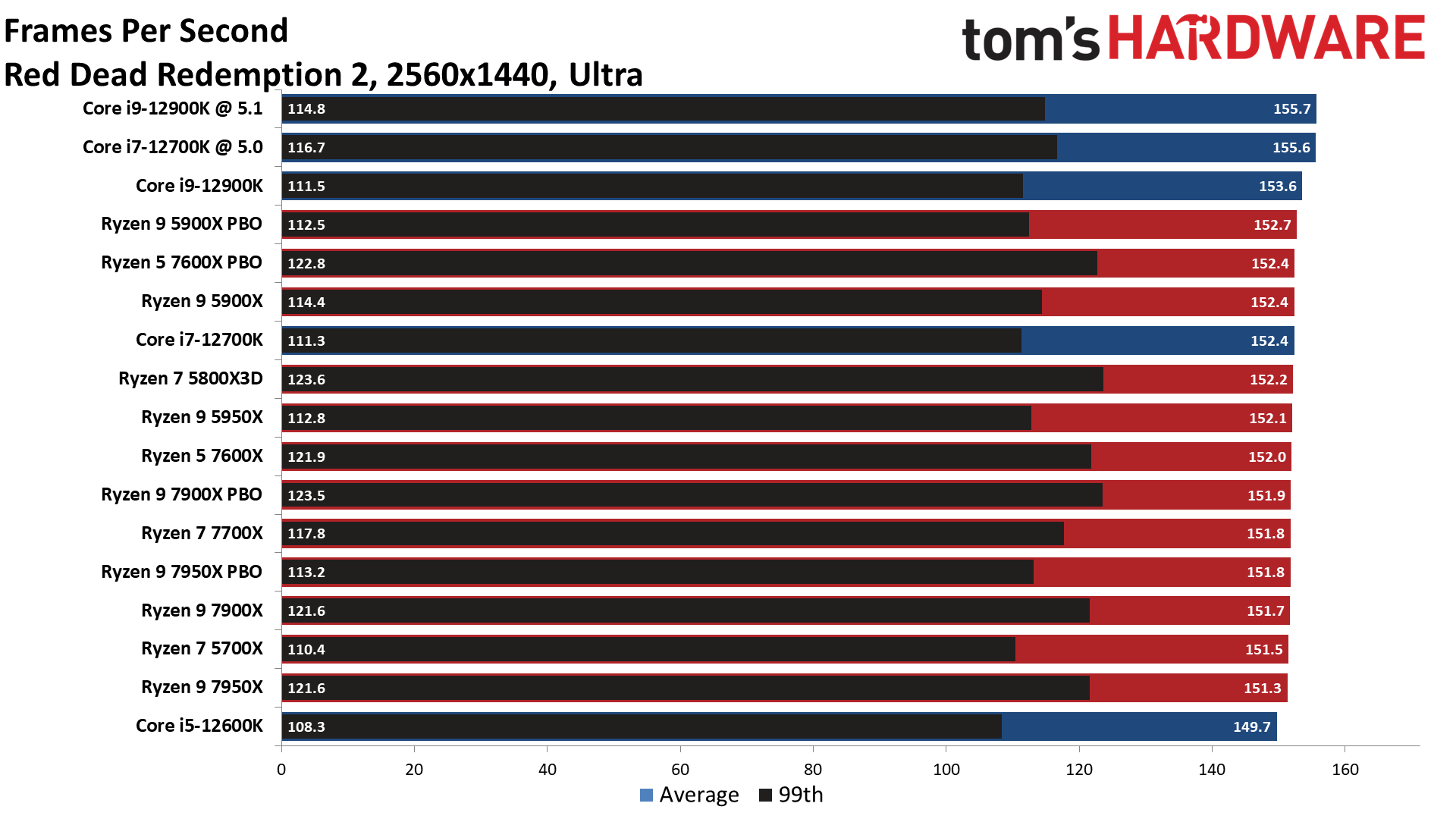
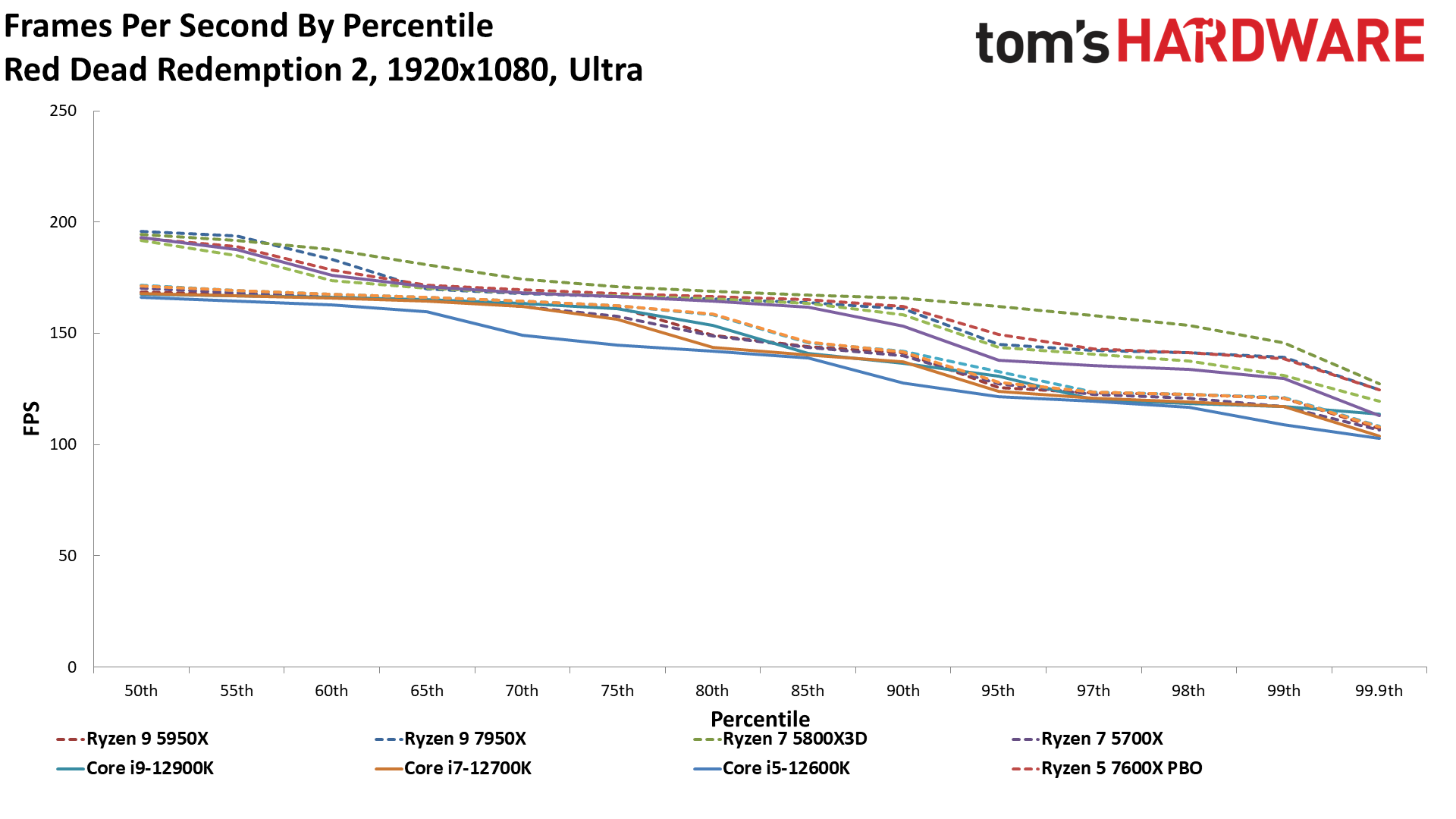
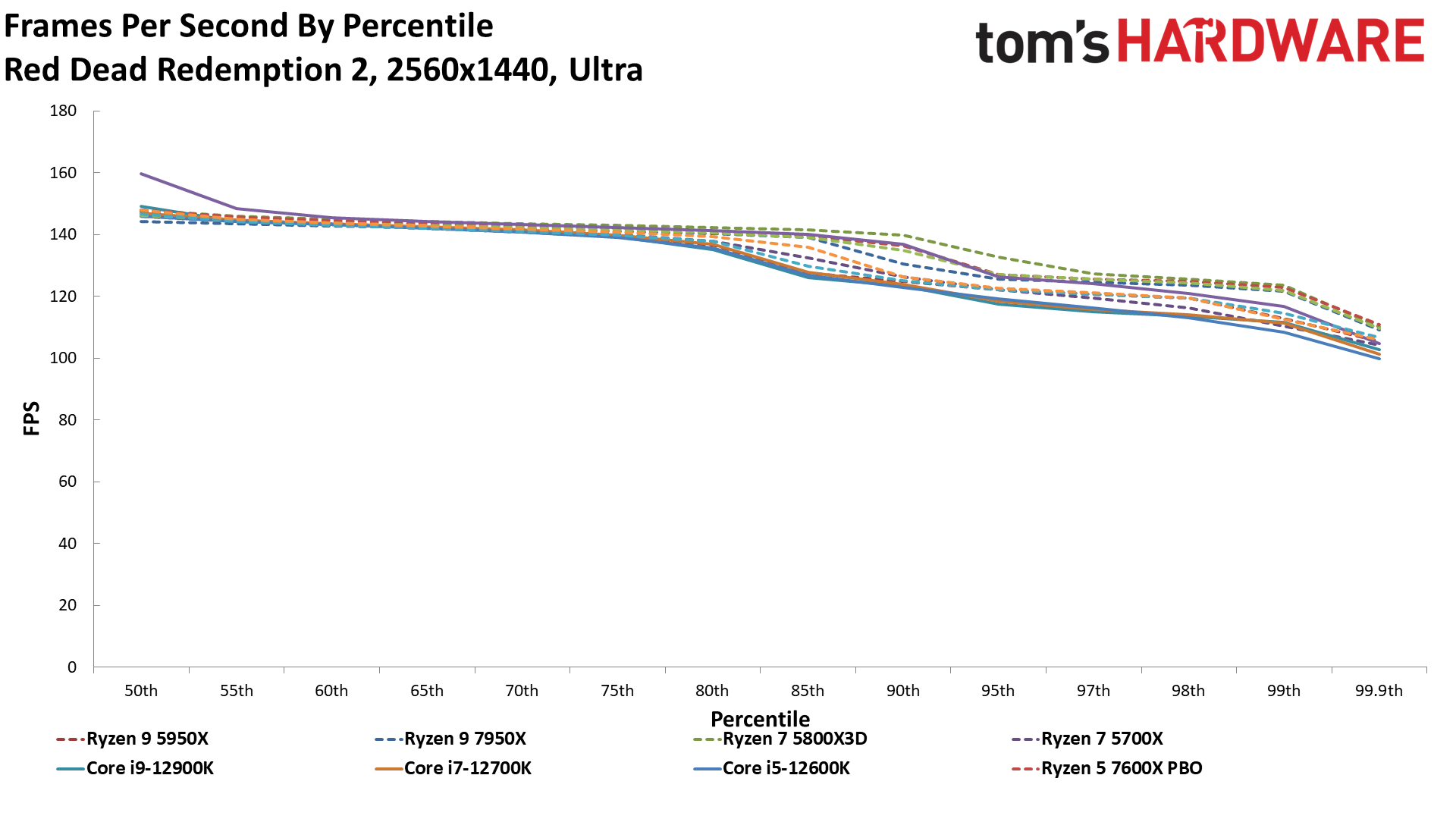
The Zen 4 Ryzen 9 chips don't gain much from overclocking in this title, but they don't need much help as they beat even the heavily-overclocked Core i9-12900K when they're at stock settings.
Watch Dogs Legion on AMD Ryzen 9 7900X
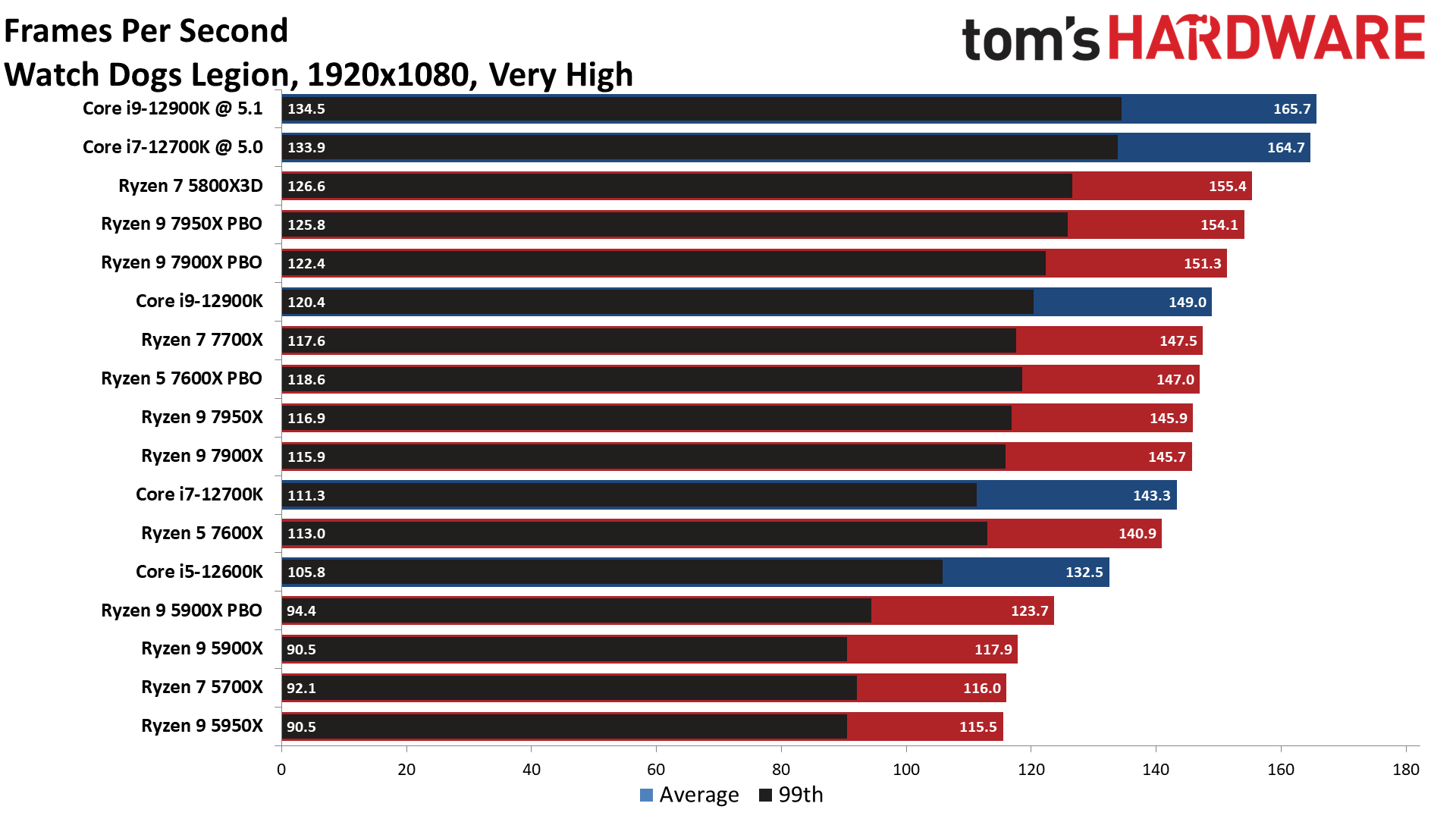
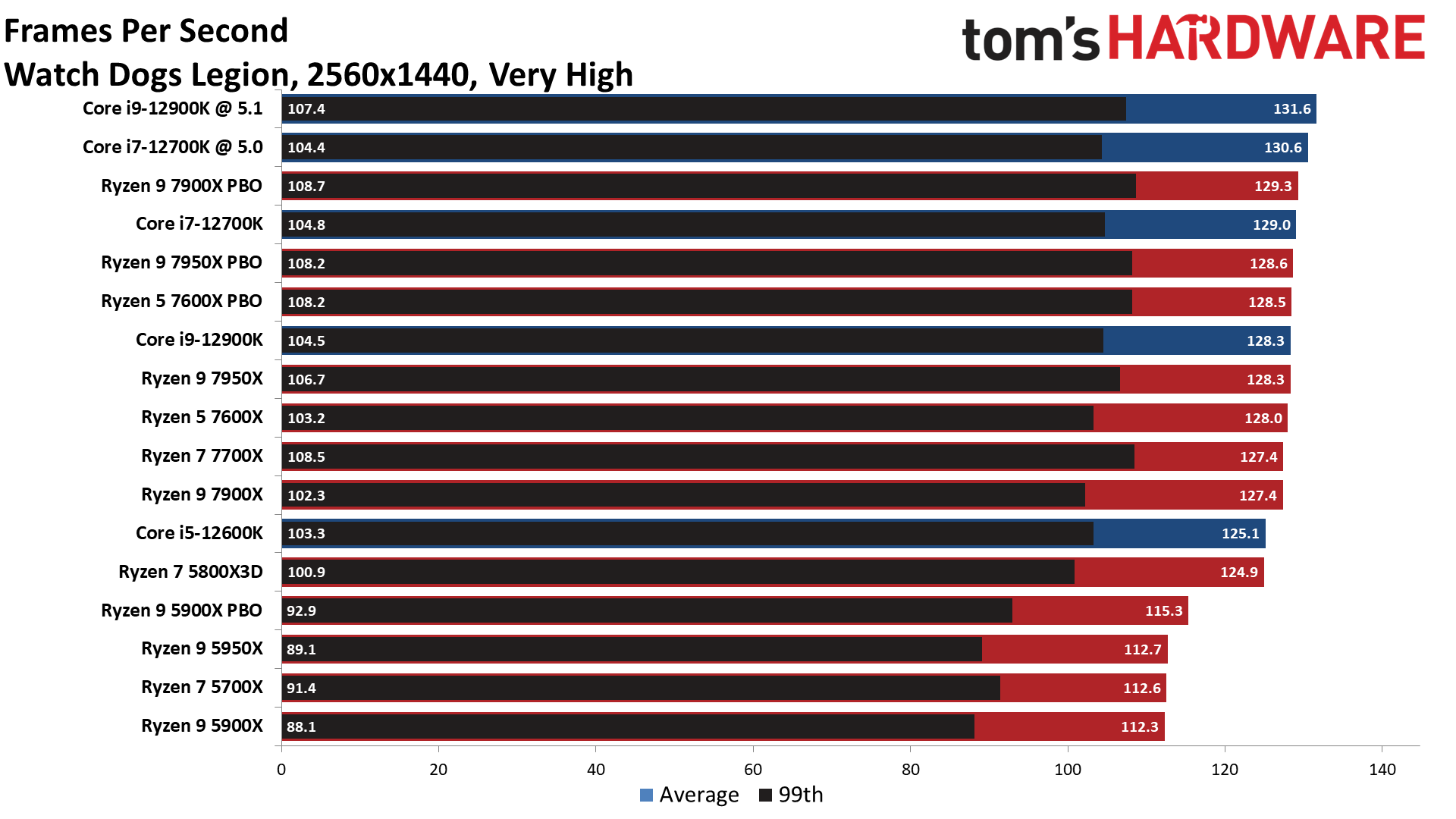
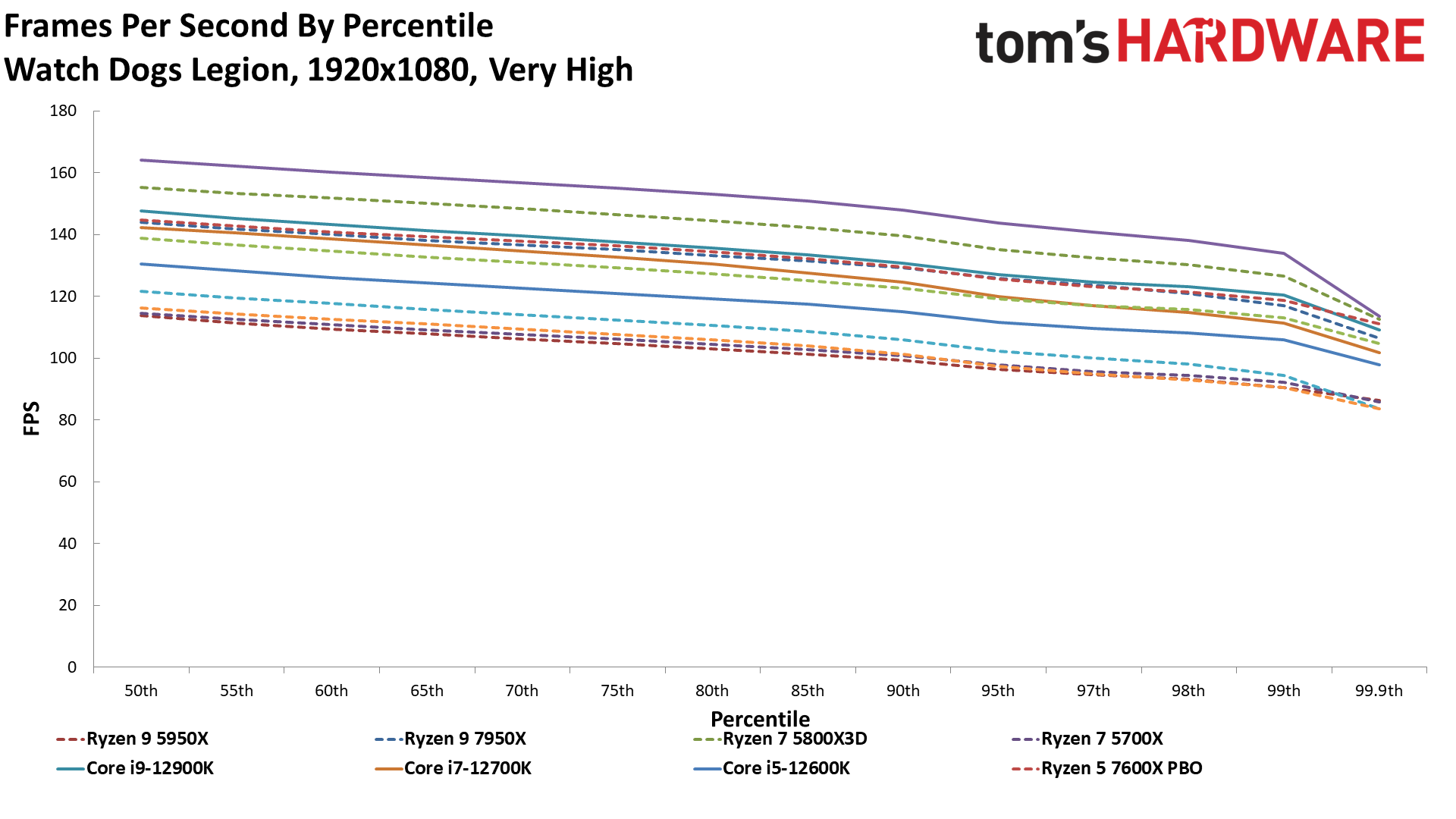
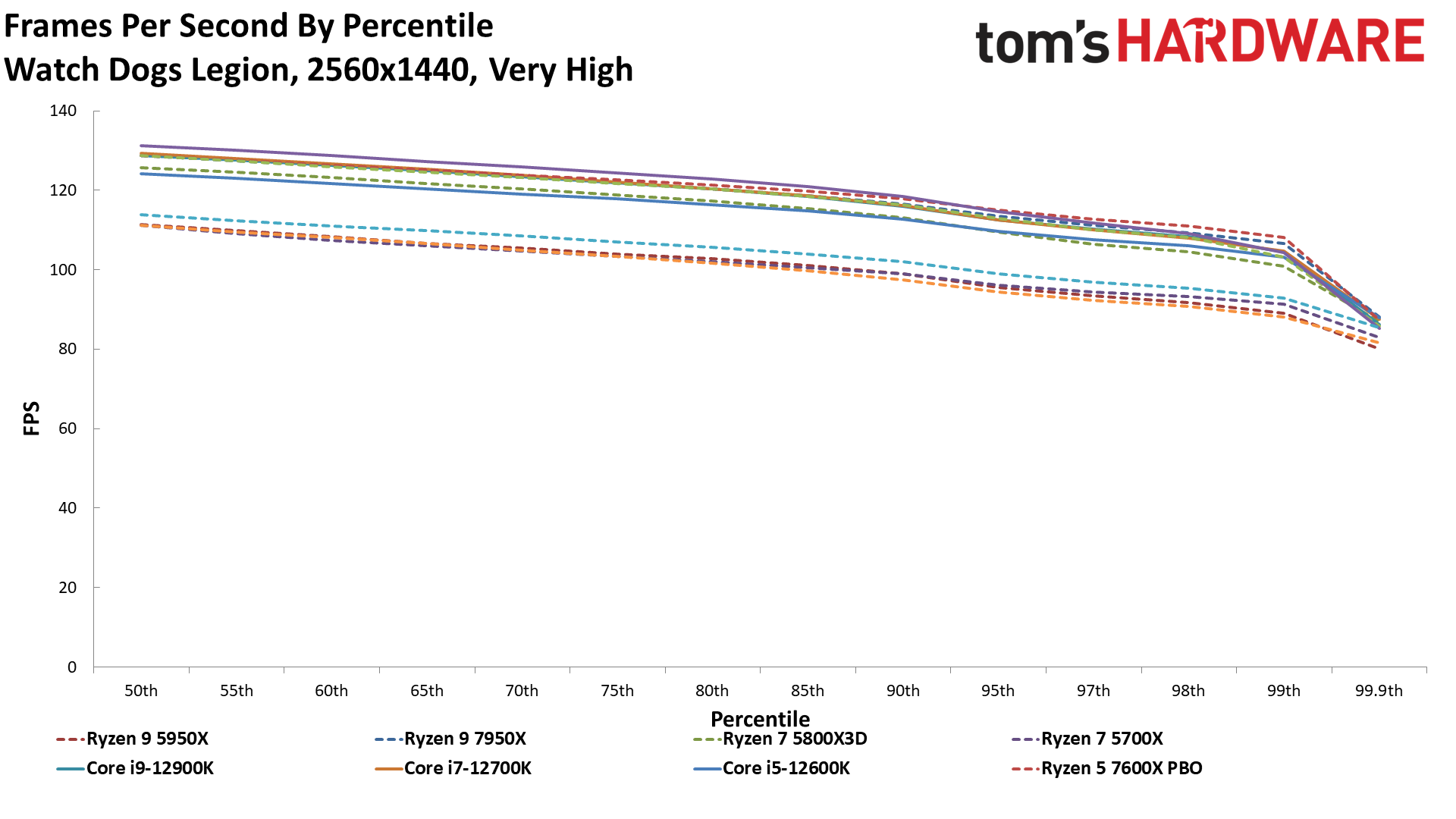
Watch Dogs Legion brings a much-needed win for the 12900K as we close out our gaming benchmarks. However, the 12900K’s lead over the 7900X is slim.
- MORE: AMD vs Intel
- MORE: Zen 4 Ryzen 7000 All We Know
- MORE: Raptor Lake All We Know
Current page: Gaming Benchmarks AMD Ryzen 9 7900X
Prev Page Boost Frequencies, Temperatures, Test Setup, AMD Ryzen 9 7900X Next Page Desktop PC Application Benchmarks on Ryzen 9 7900X
Paul Alcorn is the Managing Editor: News and Emerging Tech for Tom's Hardware US. He also writes news and reviews on CPUs, storage, and enterprise hardware.
-
chalabam The charts are hard to read. The fonts are too small, and the lines and dashes are very difficult to tell apart.Reply -
ddcservices Yet more nonsense in a supposedly unbiased review. Motherboards aren't really all that much more expensive than what came out for previous generations, outside of the boards that have far too many features or just add things that will cost a lot. PCI Express 5.0 support for example...a single PCIe 5.0 M.2 slot would be normal, and you will get it from all of the AM5 motherboards. Add a x16 slot with PCIe 5.0, and that adds to the prices.Reply
So, beyond this, boards like the Asus x670e Hero for $700...three M.2 slots with PCIe 5.0 speeds, the number of ports, this and that...yep, excessive, but the number of PCIe 5.0 slots are going to do that, along with Asus just charging a lot. The ASRock boards are NOT overpriced, and many of the other motherboards aren't overpriced really. So, no reason to complain about prices.
DDR5...$70 more than good DDR4 memory, compare the price of DDR4-3600 to DDR5-6000, yea, a bit of a price premium for DDR5, but it's new, and DDR5 prices are NOT really horrible. So, "pricing problem" seems to be more about an Intel bias, because other than, "it's new and hasn't been discounted". The pure gaming performance people will be happy with older AM4 for this generation and the Ryzen 7 5800X3D, but for those who do more than play games, honestly, motherboard+CPU+RAM all at the same time, CPU prices are NOT at a premium compared to previous generations, motherboards are generally at a comparable price, outside of a lack of cheap/low end boards that have no features, and B650 will cover that for the most part. RAM, don't compare DDR4-3000 to DDR5-6000 for price, because that's not a fair comparison. As I said, G.skill Trident Z5 Neo 6000CL30 vs. DDR4-3600CL14, what's the real price difference? Not really enough to complain about.
I may be biased, but not pointing out how Intel boards with similar features and on DDR5(not the cheaper DDR4 versions) are only cheaper because Intel is willing to give away chipsets at this point. -
TechieTwo According to reviews from those building AM5 systems the performance and value is fine from those not buying the extortion model mobos.Reply -
PlaneInTheSky ReplyYet more nonsense in a supposedly unbiased review. Motherboards aren't really all that much more expensive than what came out for previous generations
uhm, yes they are
The motherboards are a lot more expensive in nominal terms. Add in the depreciation of many currencies, and these AMD motherboards are extremely expensive. Add in the cost of DDR5.
The result is an outrageously expensive Zen 4 platform that doesn't even perform that well in games.
Zen 4 is going to need a massive price cut when Raptor lake arrives in a few days. Price / performance, Zen 4 is a disaster. The review is spot on. -
PlaneInTheSky ReplyDDR5 prices are NOT really horrible
Yes they are. Regardless, you have to buy new memory. It's not just about how much more DDR5 costs compared to DDR4, it's about needing to throw away DDR4 because AMD had the bright idea that dropping DDR4 compatbility was a smart move. This foolish decision is going to cost them a lot in sales. -
fybyfyby Reply
I agree with some of your statements. I bought new platform and it was worth it. But if I compare prices, DDR5 6000 EXPO costs nearly double the DDR4. Motherboard - ASUS B650 - E costs 9500 CZK and AM4 version (B550 - E) cost me 6500 CZK - but I didnt buy it at the start of the chipset. It was during the chipset lifetime. anyway, its more expensive. It may be due to PCIex5 added cost, I dont know. Also, DDR5 are new. Every gen, new DDR memories are "expensive".ddcservices said:Yet more nonsense in a supposedly unbiased review. Motherboards aren't really all that much more expensive than what came out for previous generations, outside of the boards that have far too many features or just add things that will cost a lot. PCI Express 5.0 support for example...a single PCIe 5.0 M.2 slot would be normal, and you will get it from all of the AM5 motherboards. Add a x16 slot with PCIe 5.0, and that adds to the prices.
So, beyond this, boards like the Asus x670e Hero for $700...three M.2 slots with PCIe 5.0 speeds, the number of ports, this and that...yep, excessive, but the number of PCIe 5.0 slots are going to do that, along with Asus just charging a lot. The ASRock boards are NOT overpriced, and many of the other motherboards aren't overpriced really. So, no reason to complain about prices.
DDR5...$70 more than good DDR4 memory, compare the price of DDR4-3600 to DDR5-6000, yea, a bit of a price premium for DDR5, but it's new, and DDR5 prices are NOT really horrible. So, "pricing problem" seems to be more about an Intel bias, because other than, "it's new and hasn't been discounted". The pure gaming performance people will be happy with older AM4 for this generation and the Ryzen 7 5800X3D, but for those who do more than play games, honestly, motherboard+CPU+RAM all at the same time, CPU prices are NOT at a premium compared to previous generations, motherboards are generally at a comparable price, outside of a lack of cheap/low end boards that have no features, and B650 will cover that for the most part. RAM, don't compare DDR4-3000 to DDR5-6000 for price, because that's not a fair comparison. As I said, G.skill Trident Z5 Neo 6000CL30 vs. DDR4-3600CL14, what's the real price difference? Not really enough to complain about.
I may be biased, but not pointing out how Intel boards with similar features and on DDR5(not the cheaper DDR4 versions) are only cheaper because Intel is willing to give away chipsets at this point.
So nothing to whine about. CPUs are great and if for someone AM5 is expensive, he or she can buy AM4 and it will last several years without a problem. -
somebassplayer The "pricing problem" is early adopter tax. People who want to be the first on their block to get onto 7xxxx series should expect to pay high(er) prices. The rest of us will wait until prices come down beforeReply
upgrading. -
ikernelpro4 Reply
I don't know about you but AM4 compatibility would've been clever to at least get more people / "early adopters".somebassplayer said:The "pricing problem" is early adopter tax. People who want to be the first on their block to get onto 7xxxx series should expect to pay high(er) prices. The rest of us will wait until prices come down before
upgrading.
100%. A lot of folks bought fast, perhaps even premium, DDR4 RAM in the past year or two, especially during the crazy-price pandemic.PlaneInTheSky said:Yes they are. Regardless, you have to buy new memory. It's not just about how much more DDR5 costs compared to DDR4, it's about needing to throw away DDR4 because AMD had the bright idea that dropping DDR4 compatbility was a smart move. This foolish decision is going to cost them a lot in sales.
I bought DDR4 3200 RAM and I do not plan to upgrade any time soon regardless what chip manufacturers present.
AMD simply bet on the wrong horse.
This is not a new platform that people who want to build complete new systems will fall onto, the price is not allowing that.
DDR5 is fast but you know what's also BLAZING fast? DDR4. Especially +3200 MHz. This is not a noticeble, jump like you PC unfreezes or suddenly memory intensive operations run like a night-day difference.
We have reached a point where "old" aka current hardware is so fast, that even many(!) years from now, they'll be fast and viable enough to substain.
This is not a jump from 5MB of DDR2 RAM to 16GB DDR4, this isn't a completely new platform. There's no incentive. -
Pyrostemplar ReplyPlaneInTheSky said:uhm, yes they are
The motherboards are a lot more expensive in nominal terms. Add in the depreciation of many currencies, and these AMD motherboards are extremely expensive. Add in the cost of DDR5.
The result is an outrageously expensive Zen 4 platform that doesn't even perform that well in games.
Zen 4 is going to need a massive price cut when Raptor lake arrives in a few days. Price / performance, Zen 4 is a disaster. The review is spot on.
No, it is a rather poor review, as it bases most (if not all) of its conclusion on the price of other components. In itself it wouldn't unreasonable if there was anything structurally definitive about the price of those said components: e.g. 4 channel server class motherboards. But no, AM5 mobos and DDR5 are the mainstream solutions going forward, so this review - and its conclusion - will age really badly.
AM5 X670E motherboards are already available under 300USD, and DDR5 is dropping price by the day. They won't go under DDR4 solutions pricing, but with inflation as it is, that is not really surprising, is it?
Zen 4 itself doesn't need a price cut unless Raptor outperforms its price/performance. If it does, then price cuts will be forthcoming - all the better for me :) -
cirdecus This is really not a good review. You don't knock off two stars for a product that is an excellent performer, priced well and uses the latest platform and technology. If you're upset that DD5 and AM5 costs a lot of money, that's a completely different article.Reply
Also, every new technology has come with a cost premium. Right now, you're intersecting a new socket, with new RAM technology and new PCI 5.0 tech all into one upgrade cycle. I don't care whether you go with an Intel platform or AMD platform, you're paying a lot for DD5, regardless. If you downgrade to DDR4, great, you can go with intel.
Complaining that DDR 5200 (6000 is actually what AMD recommends) is only supported by one channel and filling out the banks with 4 sticks drops the speed, is a relatively decent complaint. However, it's half a star at best. You're not going to win an argument that people need more than 64GB of highspeed memory in a system like this. If you need more, then this isn't the right platform. Users should be steered towards AMD's HEDT Thread-rippers. Mainstream processors simply don't need more than 64GB of memory. That's the equivalent of knocking an automobile manufacturer for not offering a 15000lbs towing capacity for their mid-sized trucks.